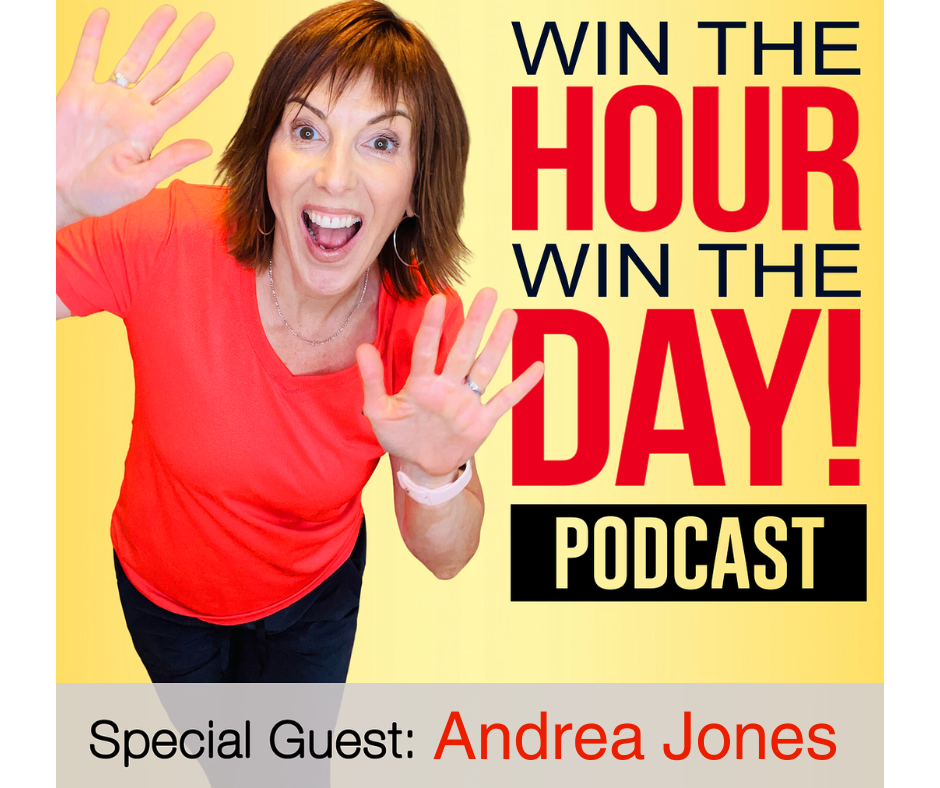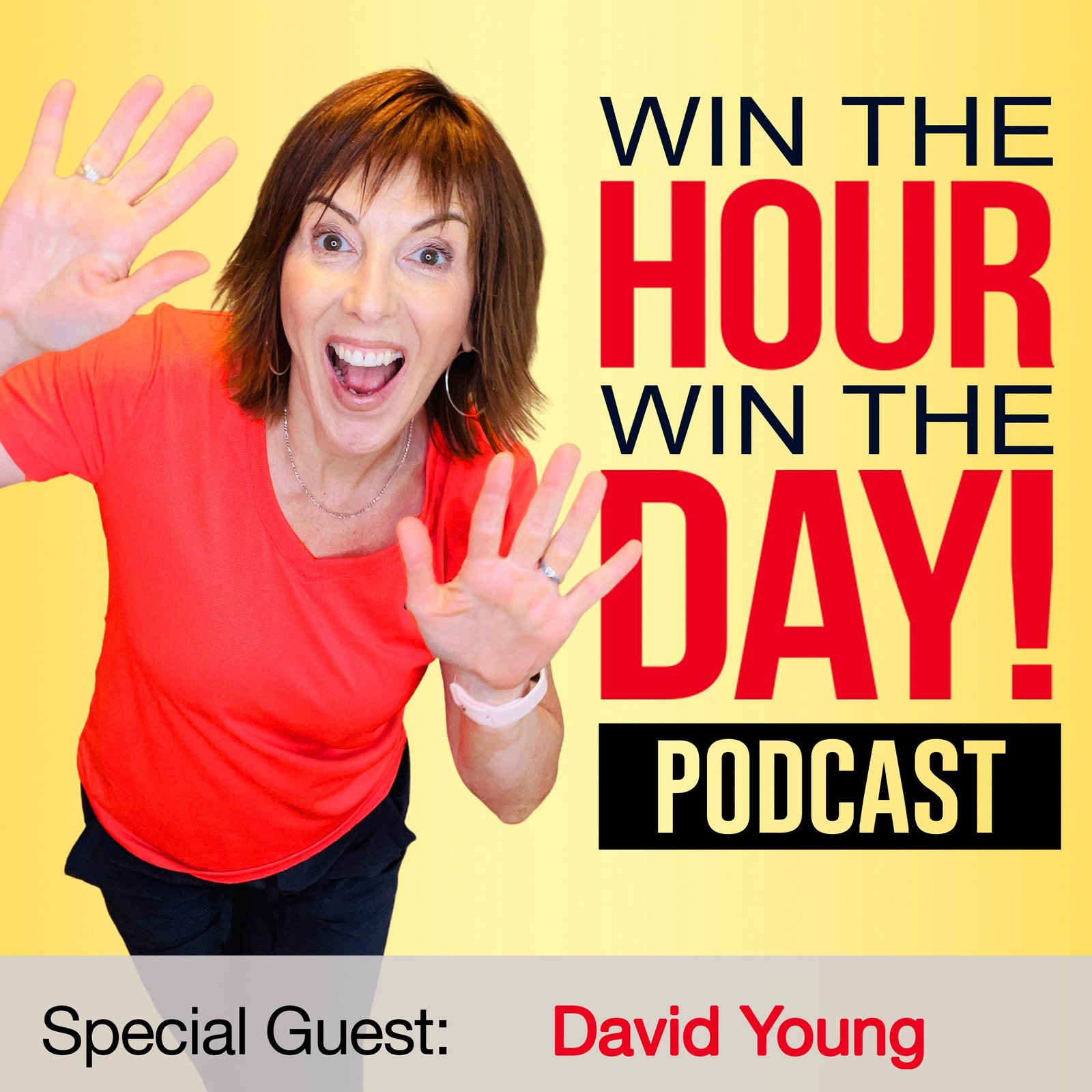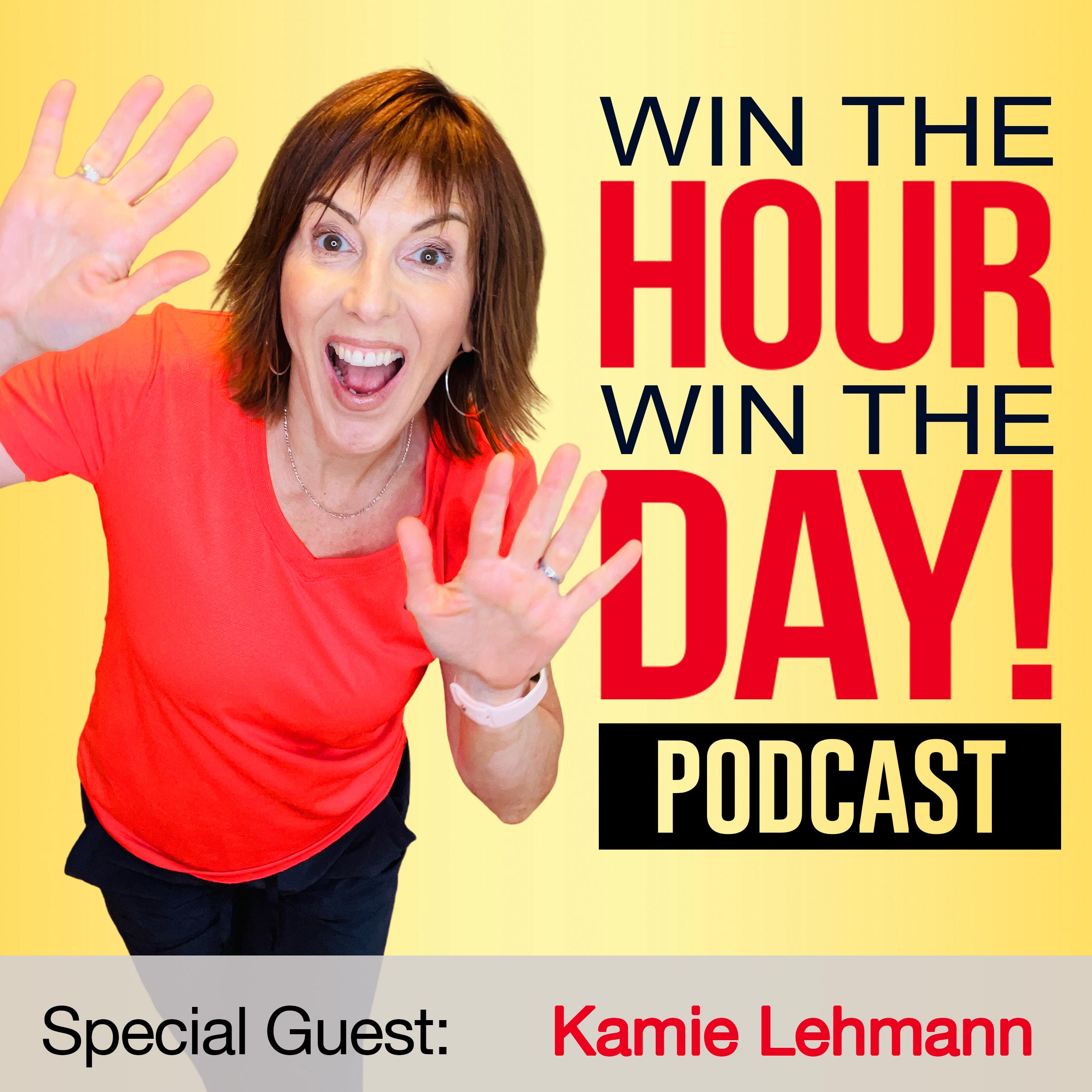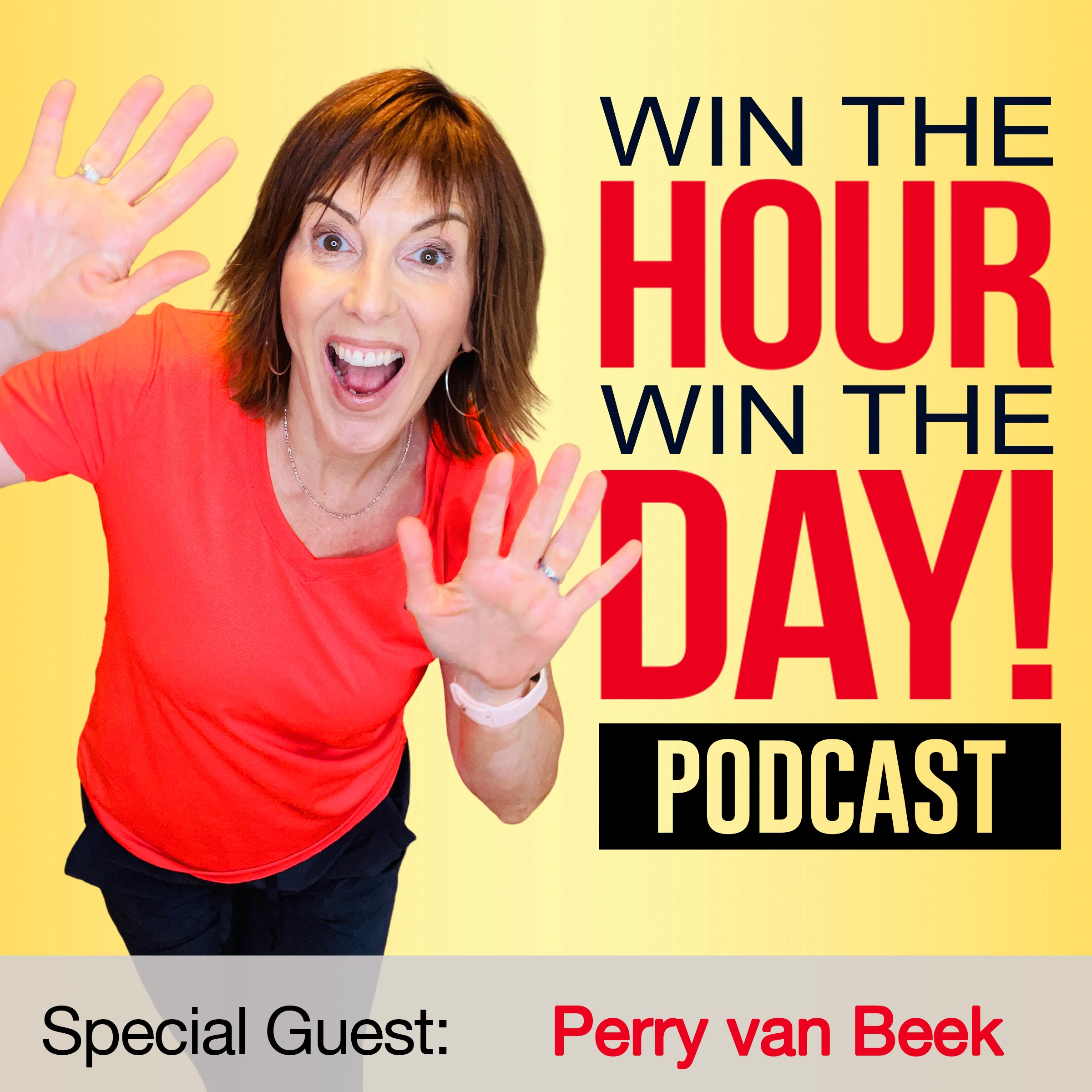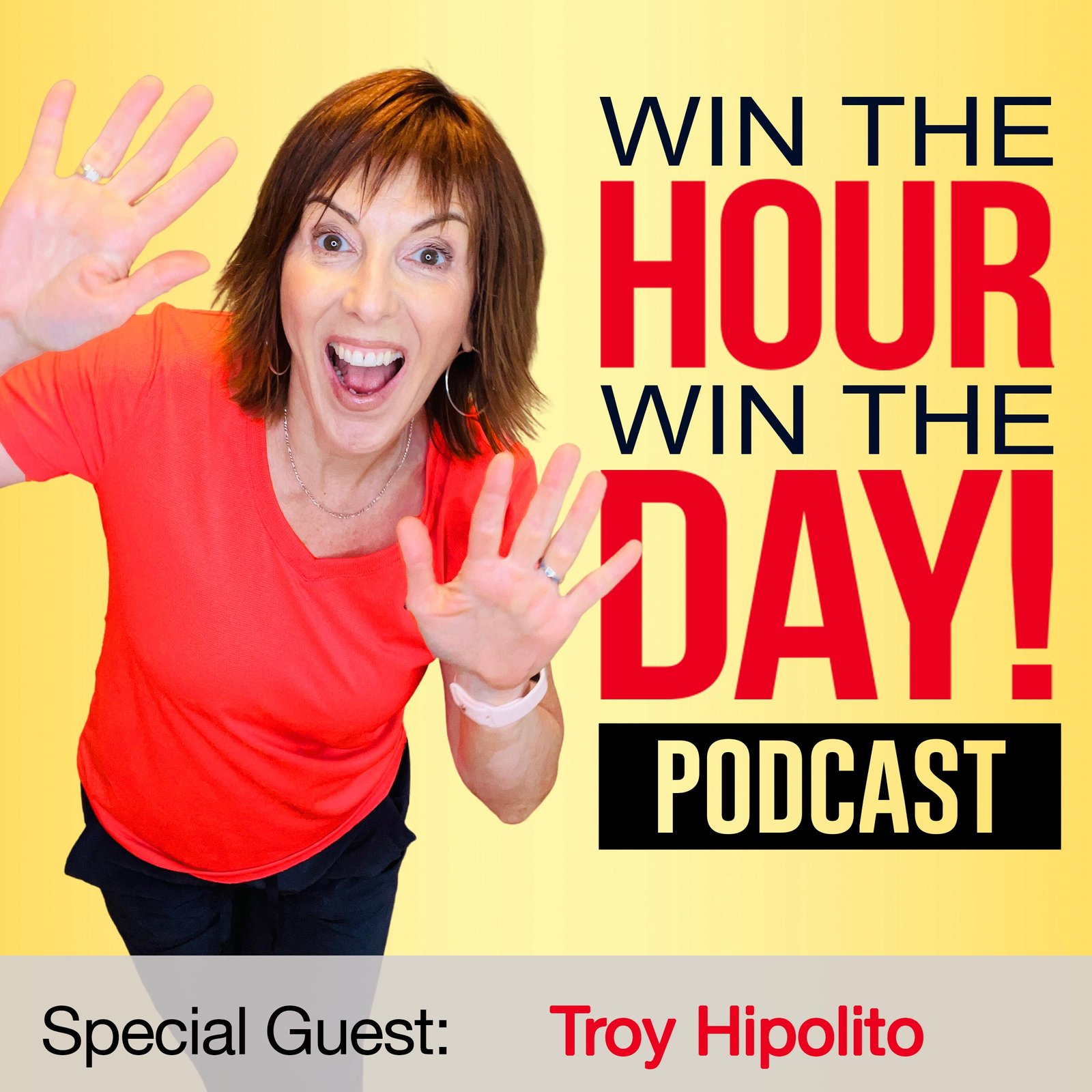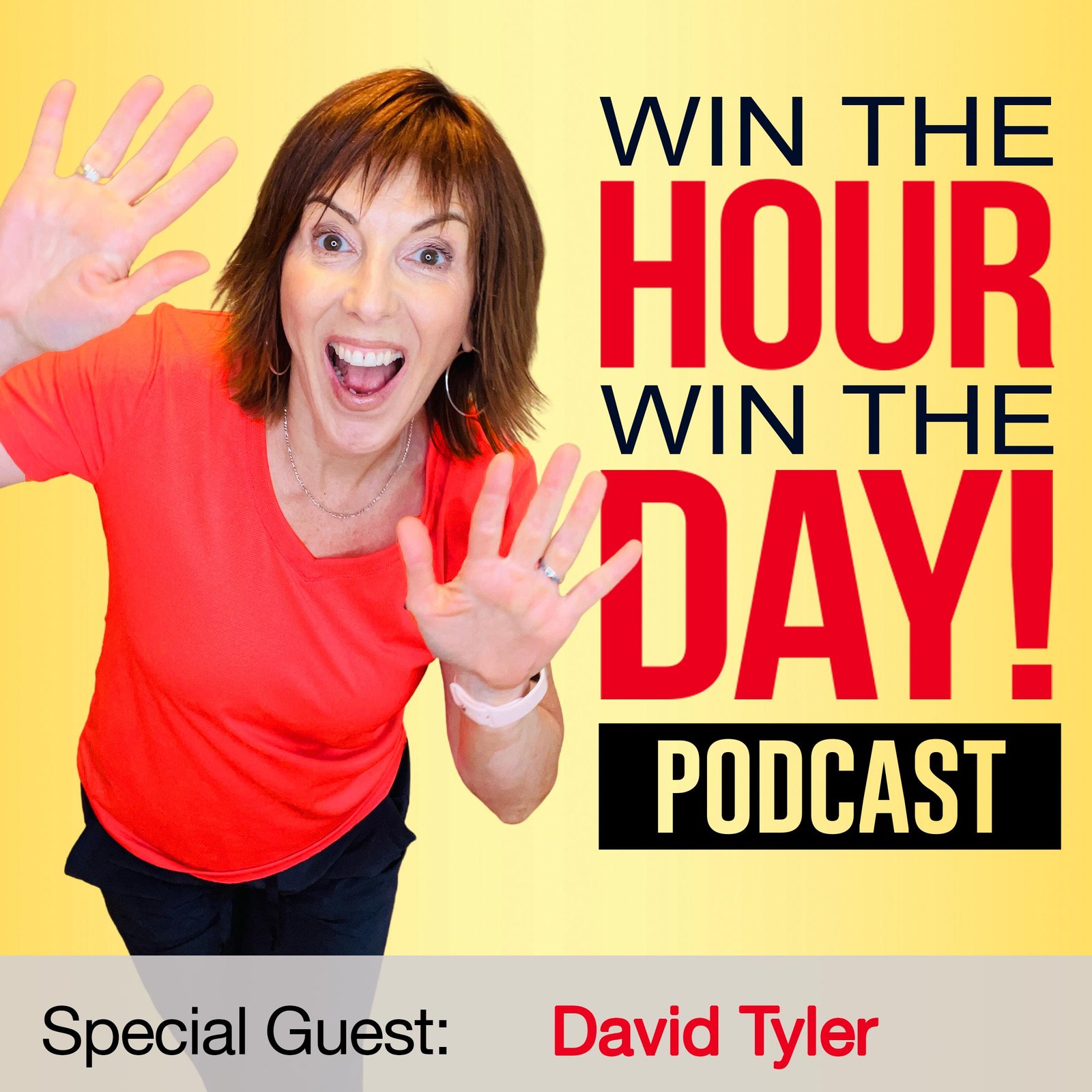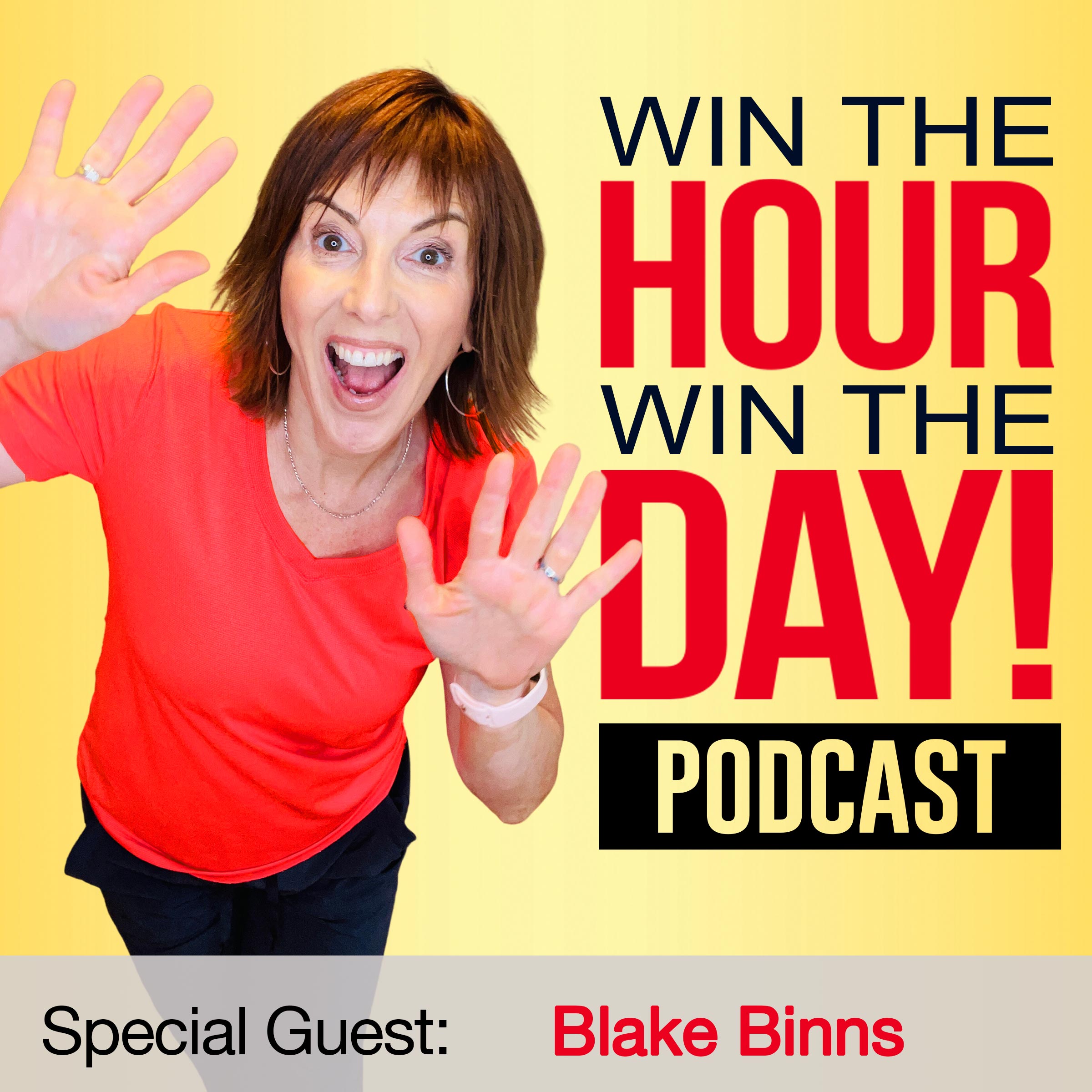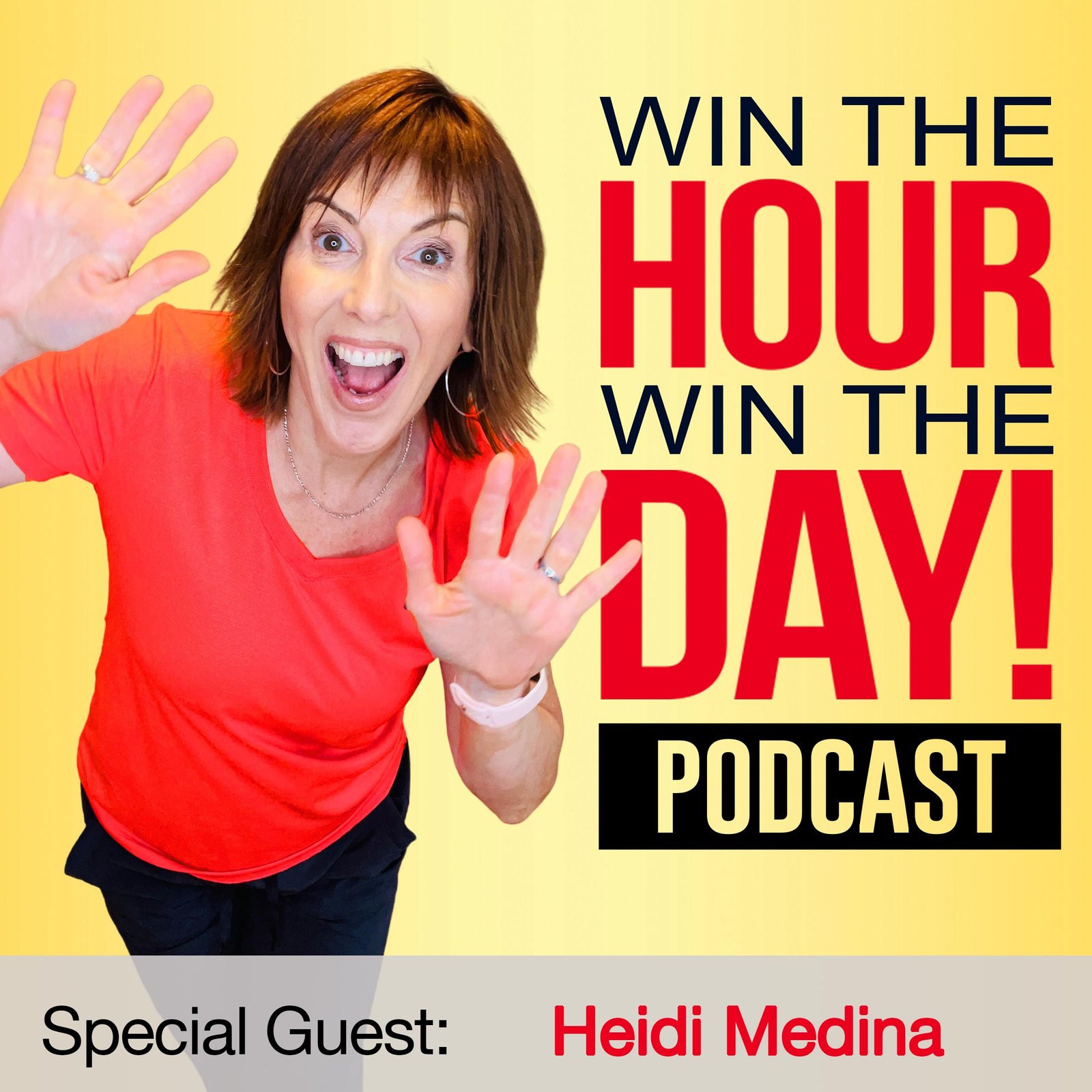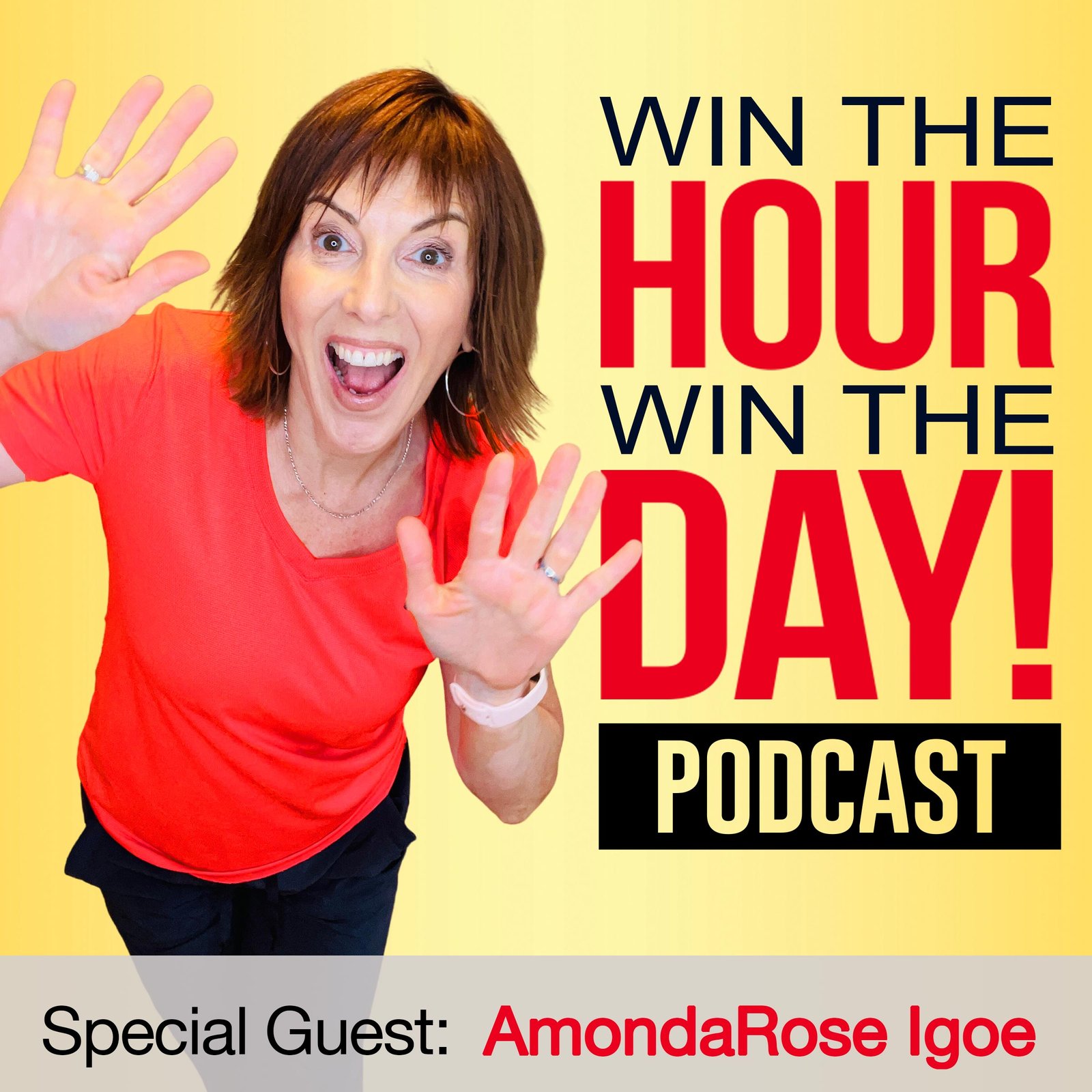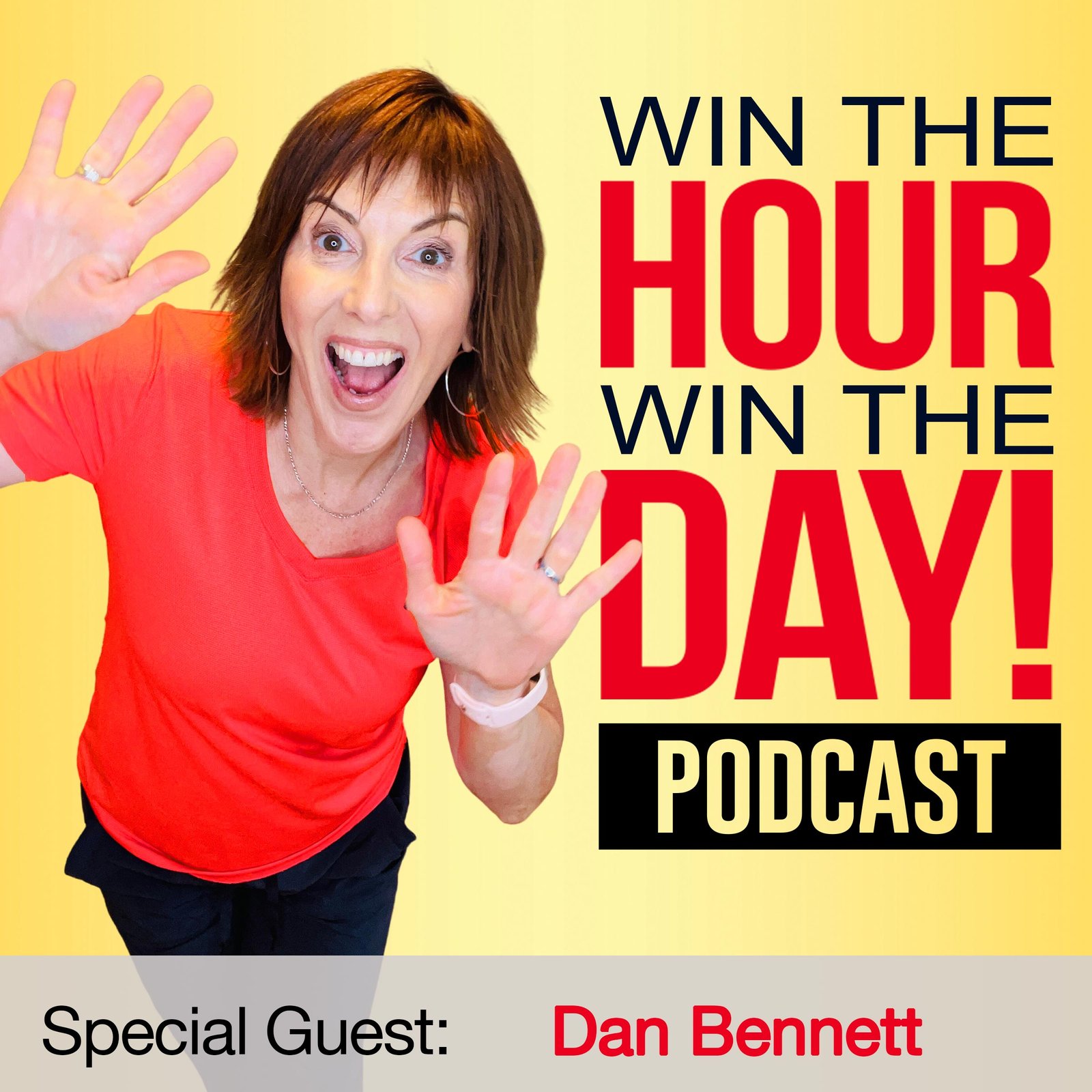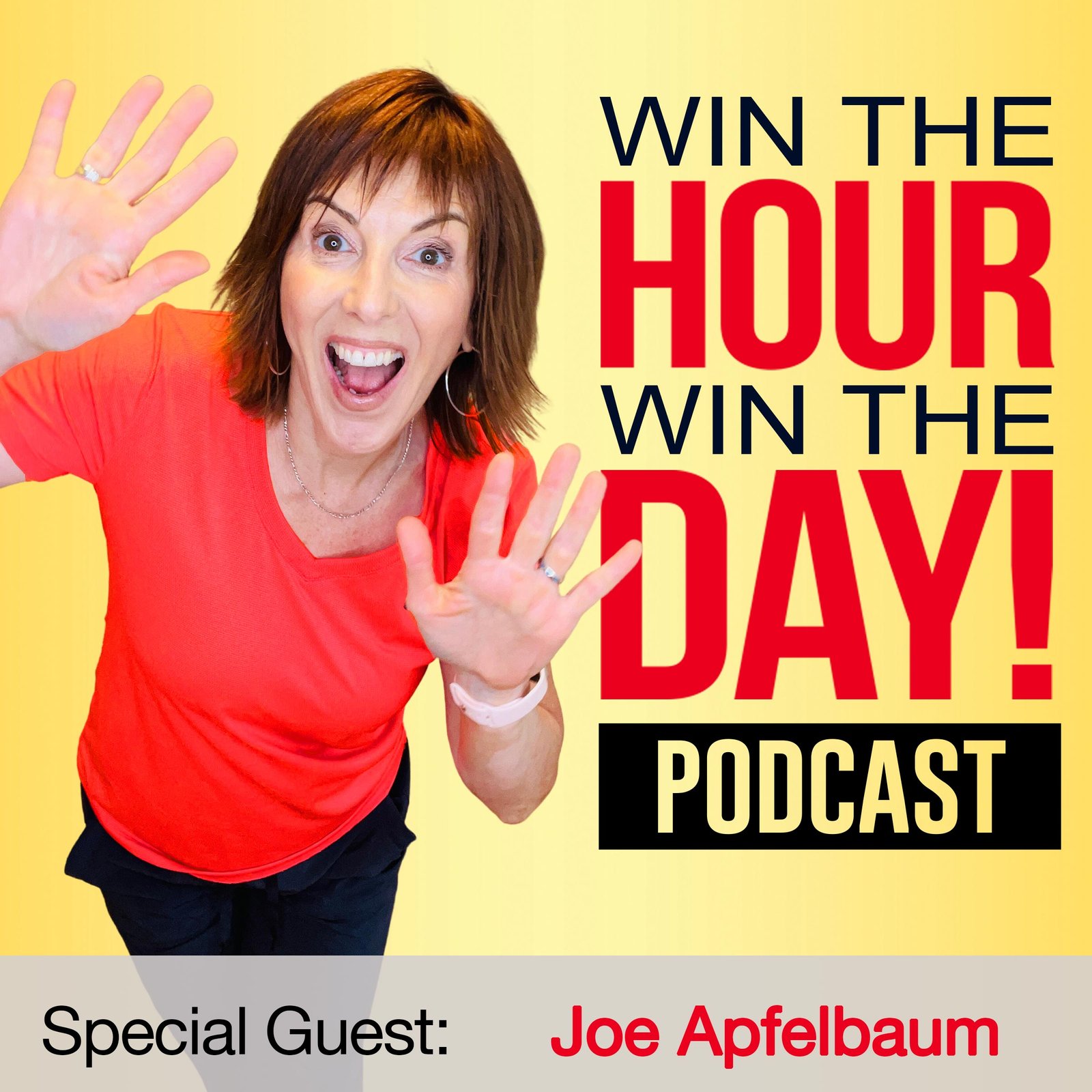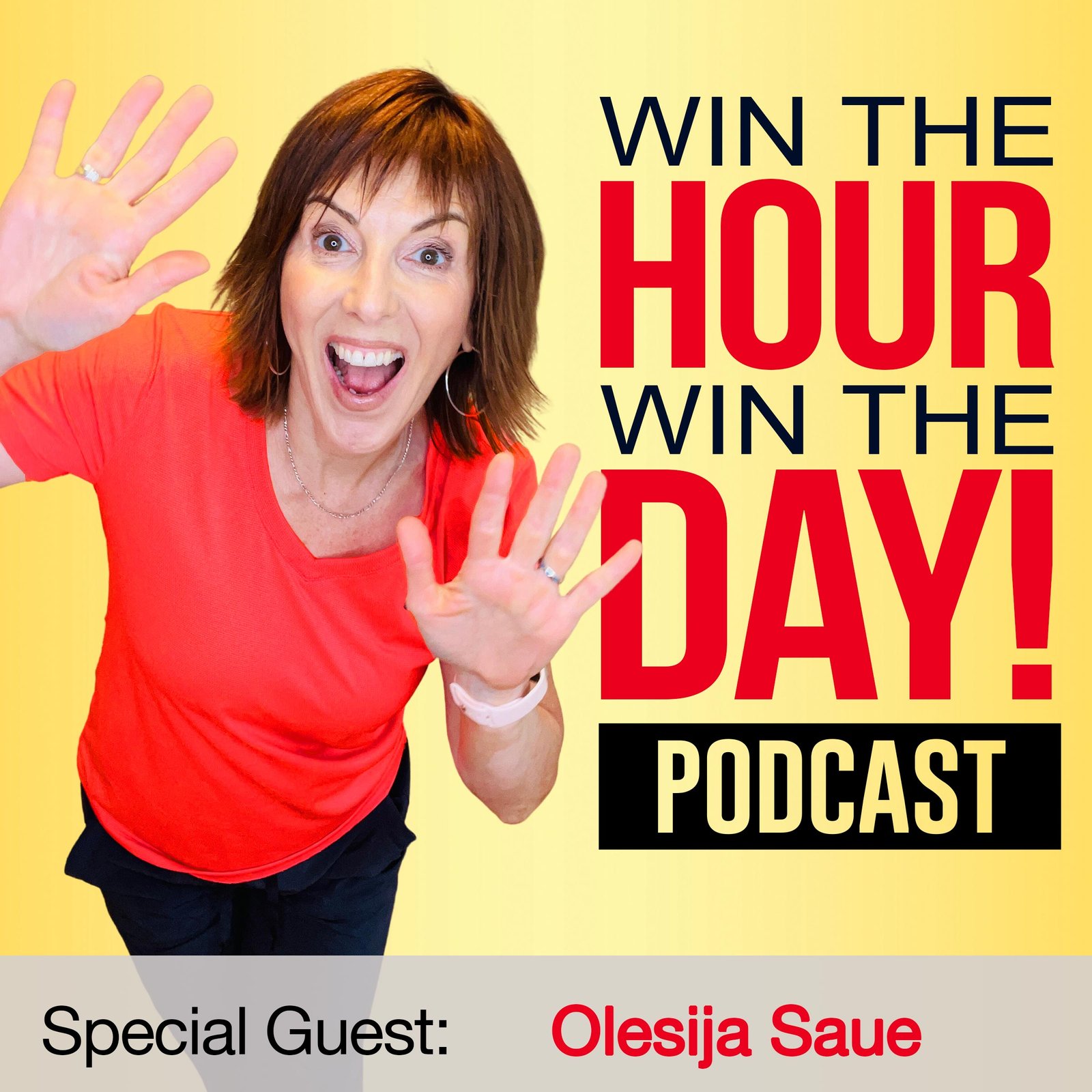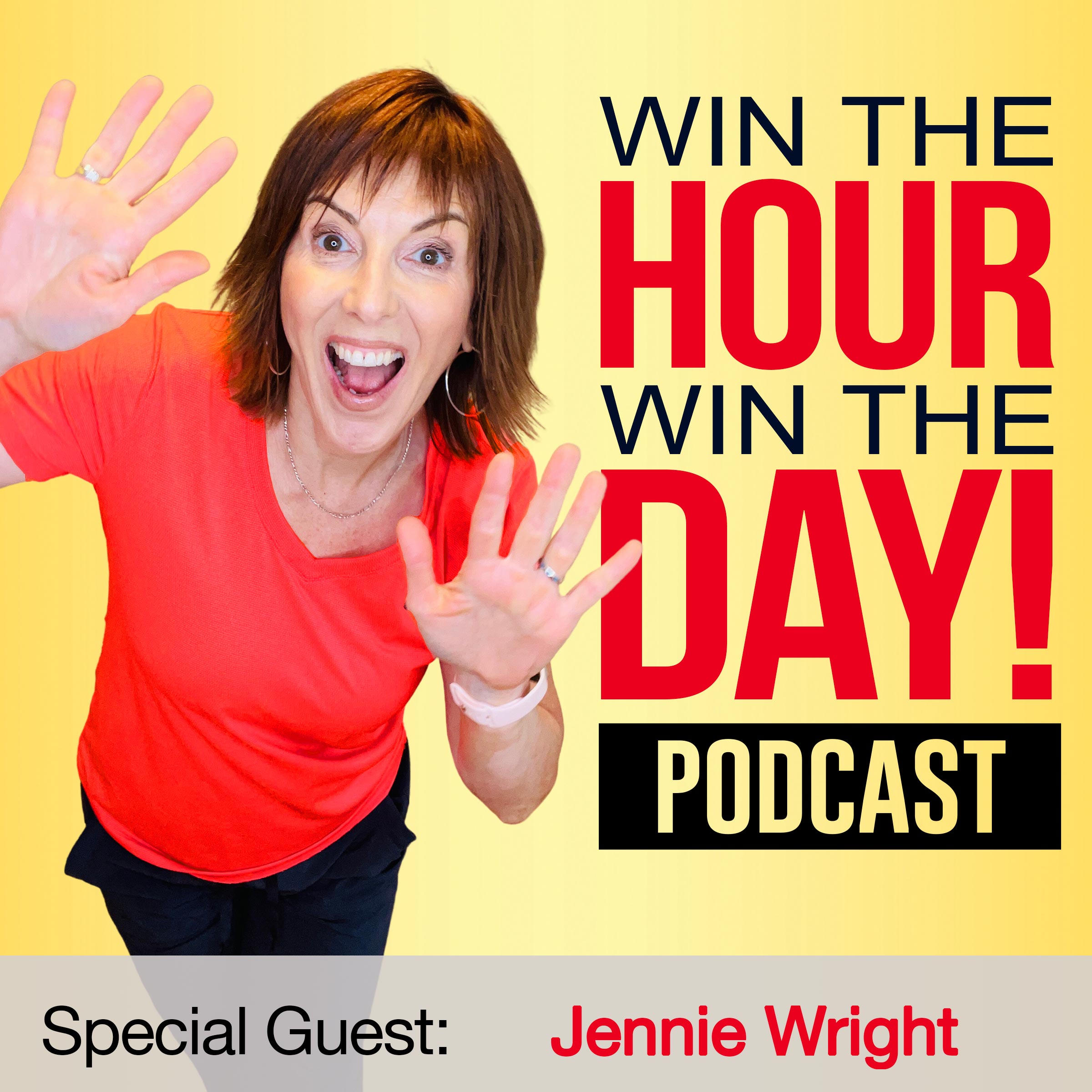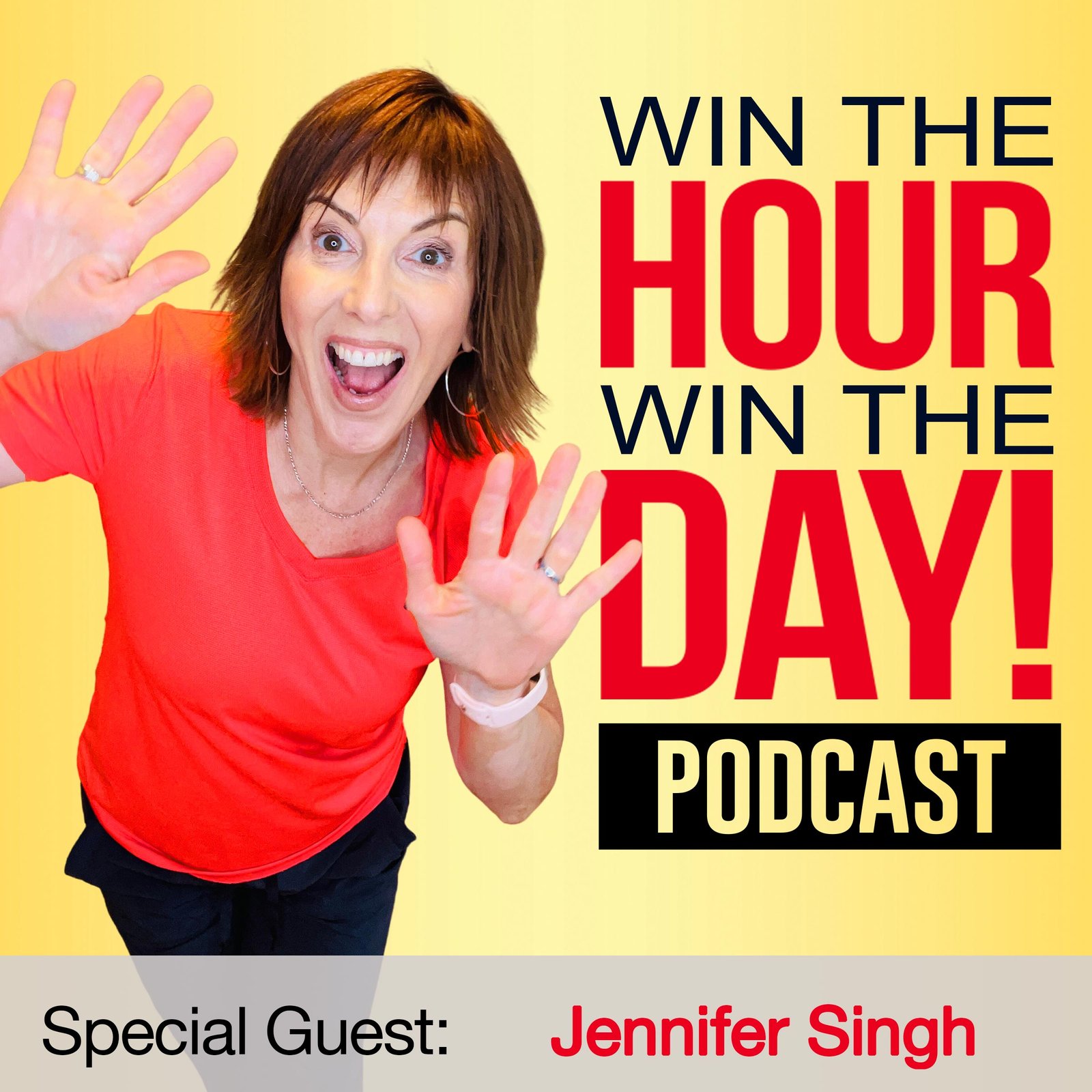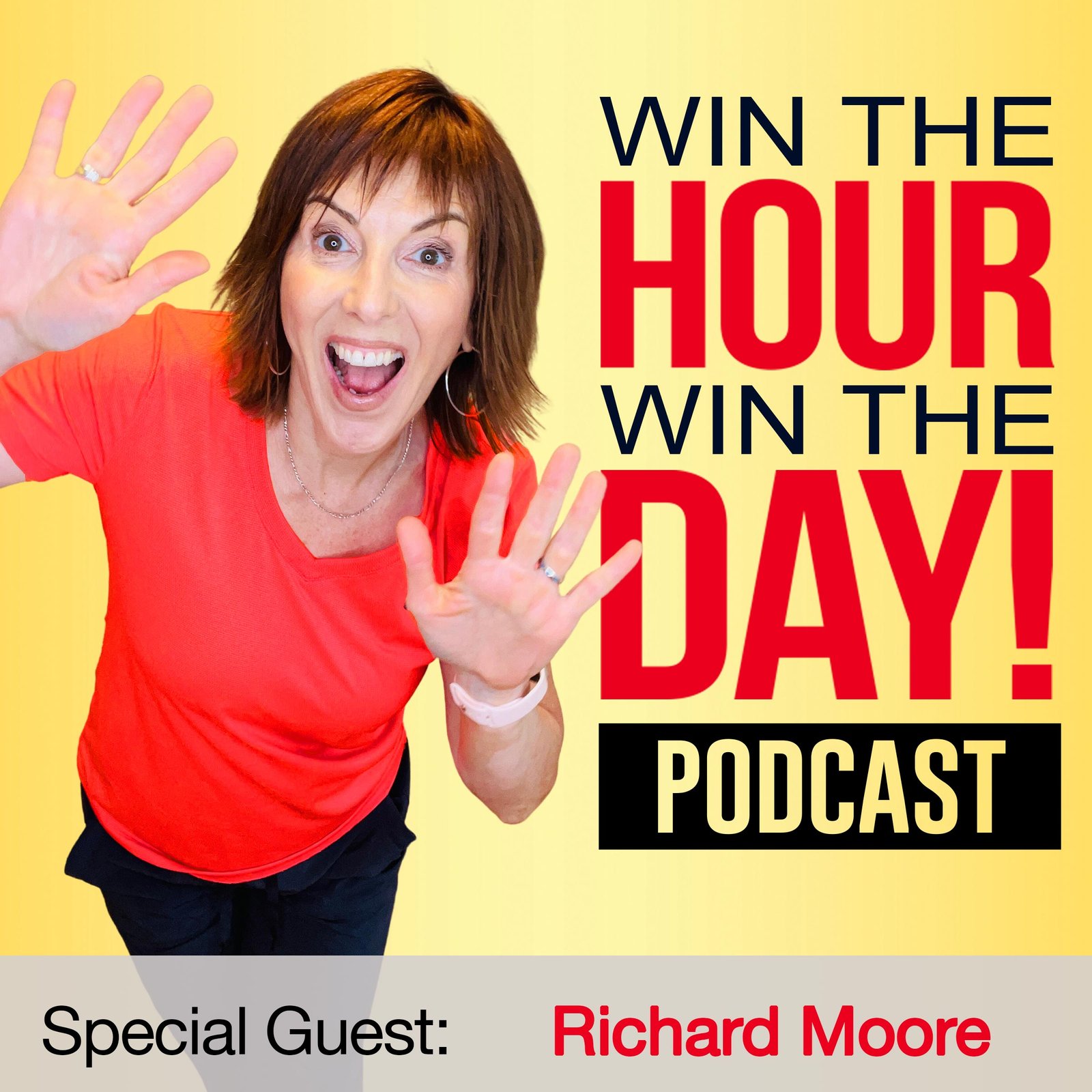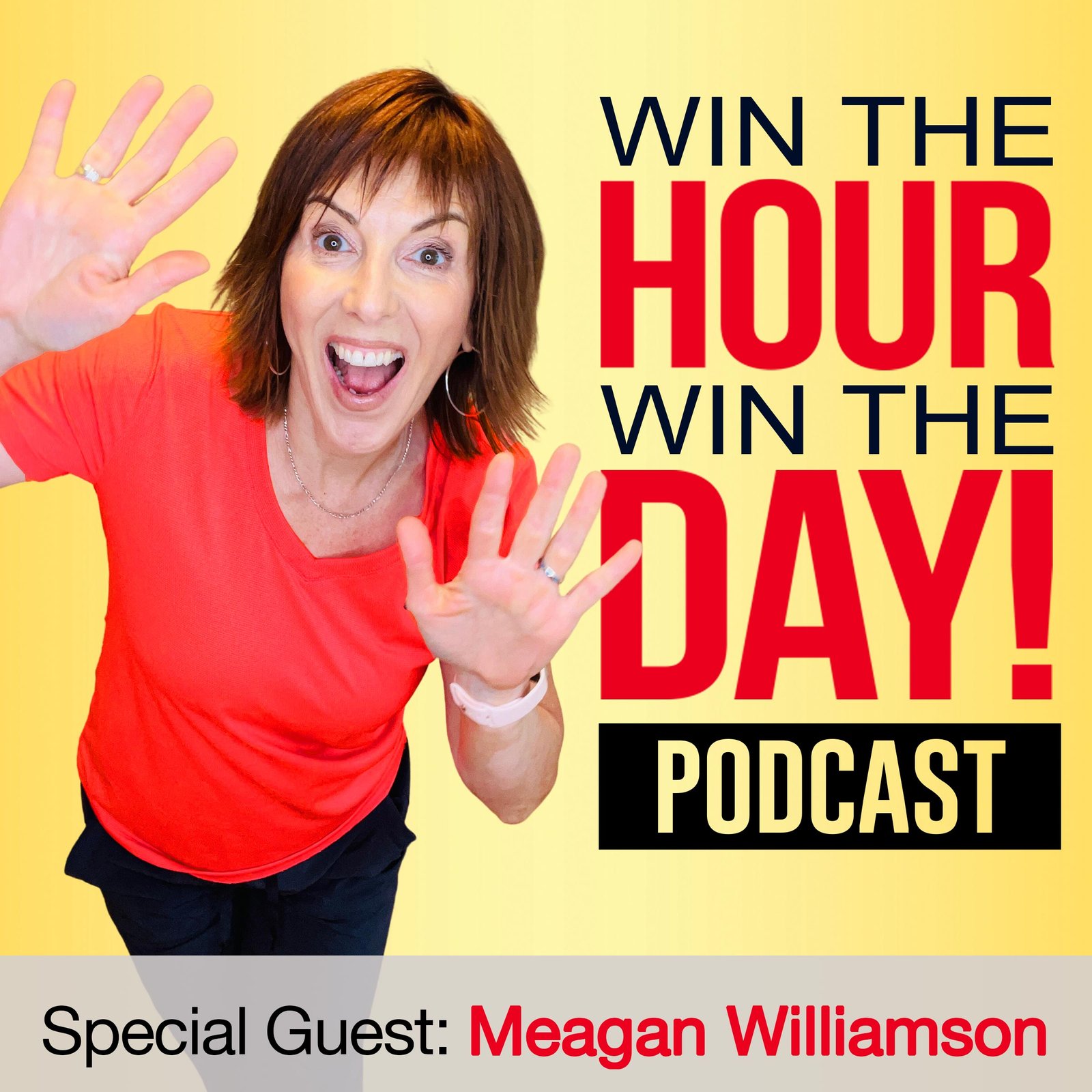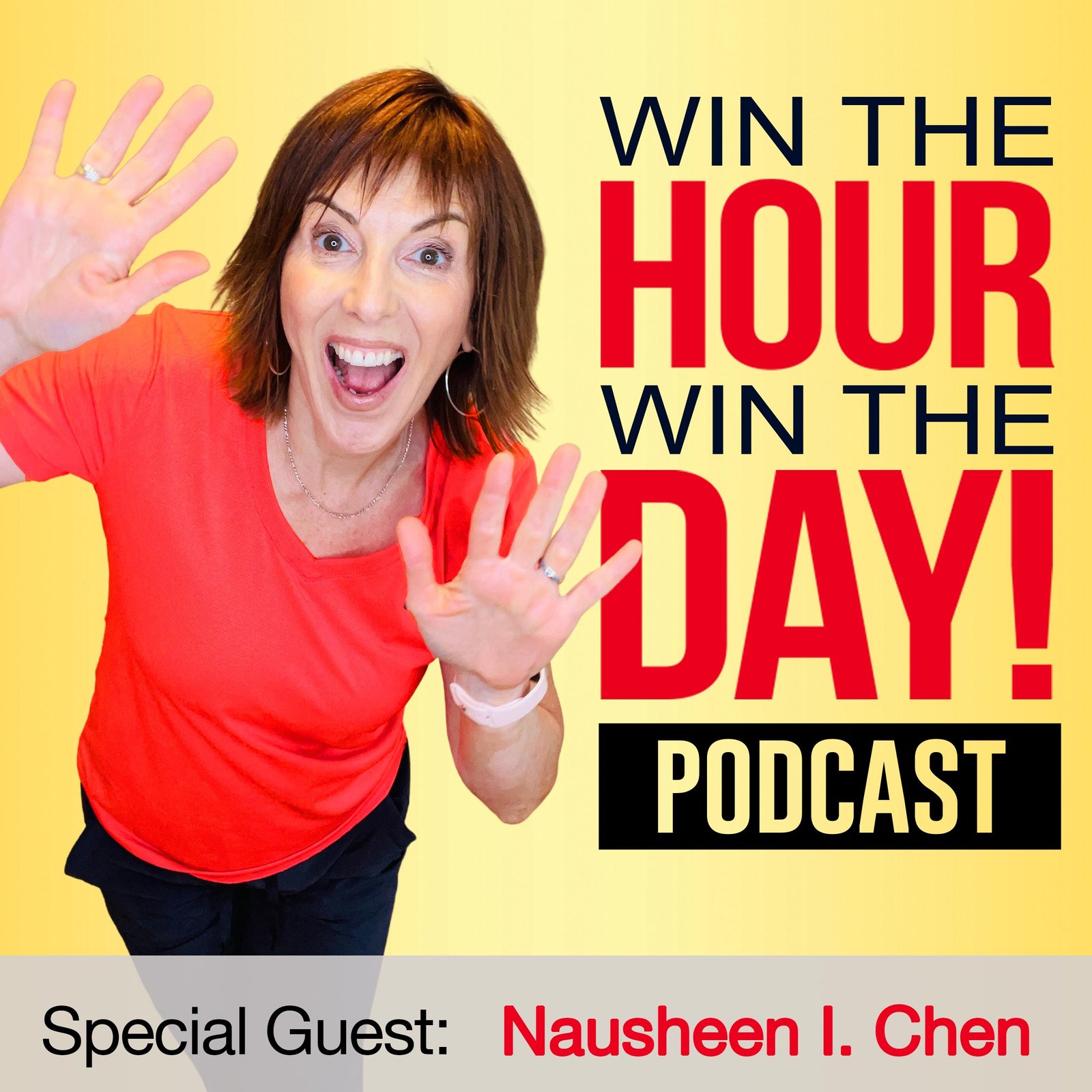Episode Summary This week’s episode of Win The Hour, Win The Day Podcast interviews,...
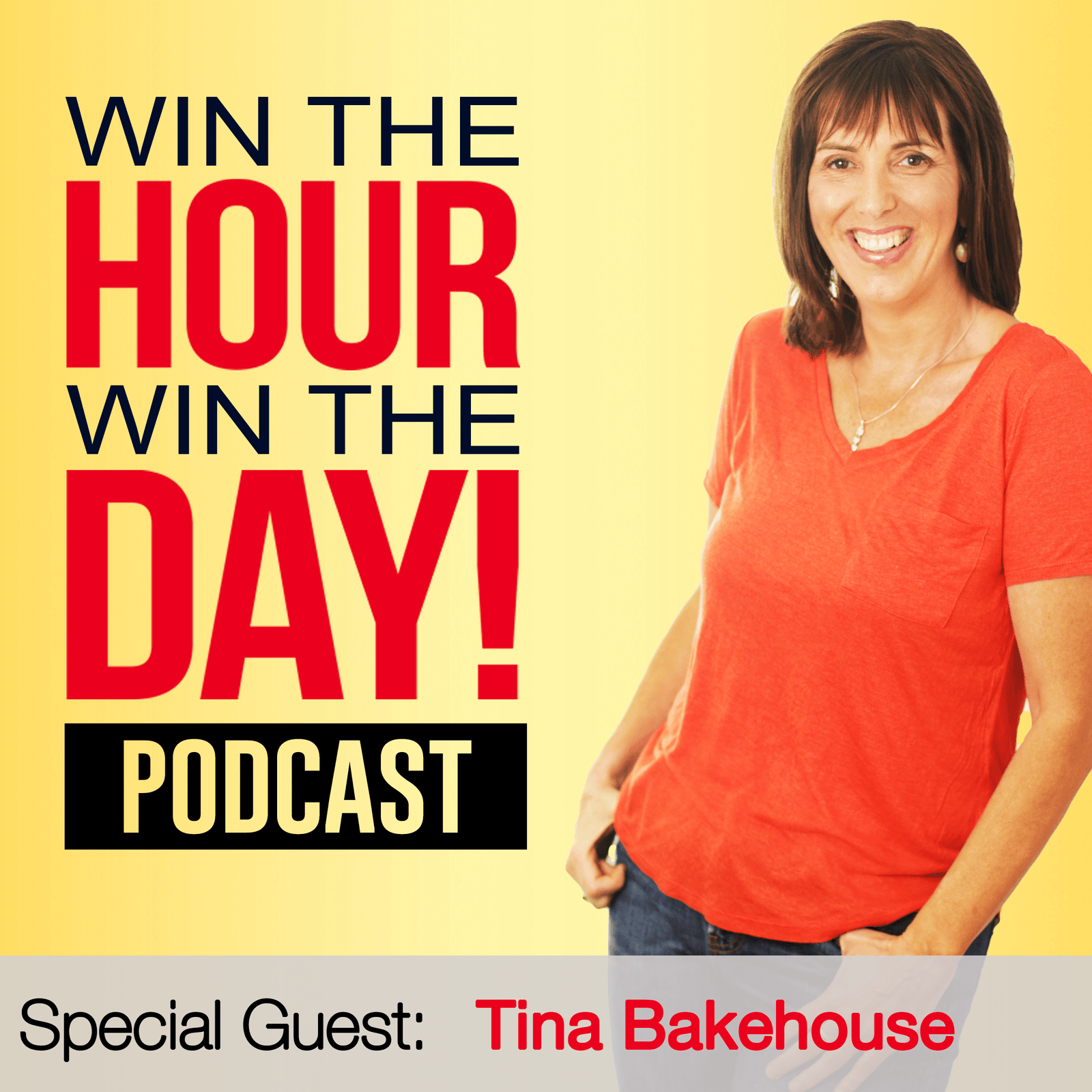
Are You Ready For Your Next Big Win?
Know your entrepreneur personality and I’ll take it from there!
Recent Podcast Episodes
Slow Down to Speed Up: Repurpose Video Content with Jeff Sieh
Episode Summary This week’s episode of Win The Hour, Win The Day Podcast interviews,...
Virtual Assistant Hiring Secrets: Leadership that Drives Success! with Wally Malaque
Episode Summary This week’s episode of Win The Hour, Win The Day Podcast interviews,...
Boost Your SEO: Leveraging Pinterest as a Powerful Search Engine! with Meagan Williamson
Episode Summary This week’s episode of Win The Hour, Win The Day Podcast interviews,...
Transform LinkedIn Posts into Binge-Worthy Stories with David Young!
Episode Summary This week’s episode of Win The Hour, Win The Day Podcast interviews,...
Leading Virtual Teams: Angelene Balansag on Empowering Workspaces
Episode Summary This week’s episode of Win The Hour, Win The Day Podcast interviews,...
Unlock Virtual Event Success: Michael Tucker’s Expert Strategies
Episode Summary This week’s episode of Win The Hour, Win The Day Podcast interviews,...
Power Your Podcast: Key Guesting and Marketing Tips! with Kamie Lehmann
Episode Summary This week’s episode of Win The Hour, Win The Day Podcast interviews,...
Unlock LinkedIn Success: Harness Sales Navigator Today! with Perry van Beek
Episode Summary This week’s episode of Win The Hour, Win The Day Podcast interviews,...
Boost Your LinkedIn Impact with Video Communication Tips! with Troy Hipolito
Episode Summary This week’s episode of Win The Hour, Win The Day Podcast interviews,...
Master Communication and Power Persuasion Skills with David Tyler
Episode Summary This week’s episode of Win The Hour, Win The Day Podcast interviews,...
The Power of Storytelling: Master Video Branding with Elin Giczi
Episode Summary This week’s episode of Win The Hour, Win The Day Podcast is...
Selling Sincerely: Blake Binns on Real Connections in Sales
Episode Summary This week’s episode of Win The Hour, Win The Day Podcast is...
Preventing Burnout with Smart Work Tools! with Kris Ward
Episode Summary This week’s episode of Win The Hour, Win The Day Podcast is...
Master Social Selling: Heidi Medina’s Strategies for Engagement
Episode Summary This week’s episode of Win The Hour, Win The Day Podcast is...
Boost Productivity and Master Storytelling! with AmondaRose Igoe
Episode Summary This week’s episode of Win The Hour, Win The Day Podcast is...
Master Video Marketing: Top Tips for Entrepreneurs with Dan Bennett
Episode Summary This week’s episode of Win The Hour, Win The Day Podcast is...
Boost Your LinkedIn Strategy with AI Tools for Enhanced Productivity! with Joe Apfelbaum
Episode Summary This week’s episode of Win The Hour, Win The Day Podcast is...
Mastering Personal Branding with NLP Techniques! with Olesija Saue
Episode Summary This week’s episode of Win The Hour, Win The Day Podcast is...
Innovative Lead Generation and Email Automation Secrets with Jennie Wright
Episode Summary This week’s episode of Win The Hour, Win The Day Podcast is...
PR Strategies for Diverse Entrepreneurial Impact! with Jennifer Singh
Episode Summary This week’s episode of Win The Hour, Win The Day Podcast is...
Convert More Clients on LinkedIn with Richard Moore
Episode Summary This week’s episode of Win The Hour, Win The Day Podcast is...
Master Business Growth on Pinterest with Meagan Williamson
Episode Summary This week’s episode of Win The Hour, Win The Day Podcast is...
24/7 Sales Boost: Video Marketing Secrets with Alex Sheridan
Episode Summary This week’s episode of Win The Hour, Win The Day Podcast is...
Master Public Speaking Tips with Nausheen Chen!
Episode Summary This week’s episode of Win The Hour, Win The Day Podcast is...
Storytelling Techniques To Grow Your Business! with Tina Bakehouse
Episode Summary
Tina Bakehouse opens our eyes to the power of storytelling. Join us as we learn more about the secret weapon of storytelling and how it can help your business.
Learn:
-why stories can have such an impact for entrepreneurs
-the simple formula for powerful storytelling
-what makes a good story and how to use it
And so much more!!!
Join The Community: https://www.facebook.com/groups/WinTheHourWinTheDay/
Win The Hour, Win The Day! www.winthehourwintheday.com
Podcast: Win The Hour, Win The Day Podcast
Facebook: https://www.facebook.com/winthehourwintheday/
LinkedIn: https://www.linkedin.com/company/win-the-hour-win-the-day-podcast
You can find Tina Bakehouse at:
Website: tinabakehouse.com
Email: tinab@tinabakehouse.com
Facebook: https://web.facebook.com/profile.php?id=100002417080446
LinkedIn: linkedin.com/in/tina-bakehouse-ma-36581232
Masterclass: Working Hard Sucks And It’s Costing You Money!
https://winthehourwintheday.com/working-hard-sucks-and-its-costing-you-money-masterclass
Win The Hour Win The Day
https://winthehourwintheday.com
Check out the Outsourcing Playbook For Busy Entrepreneurs here: https://winthehourwintheday.com/outsourcing-playbook
Tina Bakehouse Podcast Transcription
[00:00:07]Kris Ward: Okay.
[00:00:06] Perfect. Okay. So I do promise to interrupt you, because I want it to be conversational. And, sometimes when I can, I try to stick to this. So I’m going to jump in ’cause really what usually happens. I want to unpack your brilliance. So when you see something amazing, I want to slow it down and ask a few questions.
[00:00:24] So I know this seems redundant, but when I put up my finger and lots of times I don’t, but if I do, don’t say, oh, go ahead. You’ve got your finger up. And I know that sounds stupid, but people have done that. I’m like, okay. I think you’re missing the social cues thing, but okay.
[00:00:37]Tina Bakehouse: So just pause.
[00:00:39]Kris Ward: Yeah. Just slow it down so I can jump in.
[00:00:42] All right. Perfect. Now may I do two things? May I skim over your bio? And may I give you a little bit of feedback on that? Is that okay? So I would describe you as a dynamic force that is very memorable and instantly likable. And I think you have something to offer that’s very refreshing and different than anybody else out there.
[00:01:09] I think you’re a lot of people. What happens is you’re getting into a resume in your bio, so it should be significantly shorter, like maybe three, four sentences and be like, I would have two. So you’d have one that somebody could read in three, like three sentences. And then I have a paragraph one and I would have it more about what makes you different than what you did.
So, what is the problem you saw? And I will tell you this, if you work on it in any capacity and you send it to me, I’ll send you back a video and give you some feedback.
[00:01:46]Kris Ward: Oh, that’s sweet of you. Yeah, because marketing is my, I don’t know if you remember that, but that’s marketing clients. It’s my jam.
[00:01:53] I just don’t put it to the marketplace, but I have marketing clients. We work on that stuff all the time. So I think for most people, this would not be a good plan, but I think you are unbelievably underselling yourself because the real, the sad problem is this history and how long you’ve been doing, what you do has nothing to do with how you do it.
[00:02:15] And I also think for a regular person, this would be dry, but you’re not a dry human being. So if they resonated with this in any way, which they probably wouldn’t because it’s very long-winded like, it’s hard to retain the facts, but if they did you showing up is not going to connect to that.
[00:02:32]Tina Bakehouse: So you’ve been saying, “ I’m Tina B. Chief Communicator of Tina BLS, LLC, Public Speaking and Storytelling Coaching Company. I protect audiences from boring speeches. (period)”
[00:02:42]Kris Ward: So, and I’ll say this with love, I’ll say this with love. Nobody cares what your name is until you tell them what problem you could solve.
[00:02:52]Tina Bakehouse:So start with the problem.
[00:02:53]Kris Ward:Yeah. And the solution. Start with the problem and solution. So like me, it sounds ridiculous, but I help entrepreneurs stop working so hard.
[00:03:00] Right. Your name comes at the… nobody cares who you are until they’re interested in what you do and you want it to be short and solving a problem enough that they’ll ask questions that just help entrepreneurs stop working so hard. Okay. Let’s dive into that. Right.
[00:03:18]Tina Bakehouse: Absolutely.
[00:03:19]Kris Ward: Too many people are trying to, you’re trying to tell them all something in one draft.
[00:03:24]Tina Bakehouse: Yeah, we need to do what’s essential and get to the other and the why.
[00:03:29]Kris Ward:Yeah. What really, the ultimate thing is, what problem are you going to solve? Right. Okay, perfect.
[00:03:35]Tina Bakehouse: You got a problem. You all solve it?
[00:03:38]Kris Ward: Yes, I’ll solve it. Okay. Let me see if I can do this freaking damn now. And because it doesn’t matter at all, 20 years of teaching. You know what I mean? Cause you could be doing that poorly. Nobody said you did it well.
[00:03:52]Tina Bakehouse:That’s a great point. Absolutely. Thank you for that feedback.
[00:03:56]Kris Ward: Yeah, because duration has nothing to do with excellence right now, right?
[00:04:00]Tina Bakehouse: No, that’s a great point.
[00:04:02]Kris Ward: It’s like when you find those people that got divorced after 52 years really.
[00:04:07]Tina Bakehouse: Erases all of it.
[00:04:08]Kris Ward:Yeah. Okay. I like that duration has nothing to do with excellence. That’s a good nugget. Okay. So I’m just going to say, so the essence of what you do is persuasive speaking.
[00:04:28]Tina Bakehouse: I mean, I do coaching and consulting.
[00:04:30] I would call myself a communication analyst. So I’ve done teach, I teach individuals and teams how to share their stories, right. And perform a keynote or TEDx.
[00:04:45]Kris Ward: Okay, share your story
[00:04:48]Tina Bakehouse: And just work on mindset piece, because a lot of it is, you know, preparing your mind and getting out of your head about it. And analyze with authenticity who you are as an authentic speaker. What is your style? What kind of voice body choices do you make? I work them with the poise that takes a lot of, I see poises a verb. It’s an action. We work on those things and then you get that presence, that state of being.
[00:05:15]Kris Ward: Okay. That is excellent. And just so you know, that. That is watered down in your messaging online. Okay. Okay. So I’m going to..
[00:05:30]Tina Bakehouse:Thank you for taking the time to tell me that, because sometimes I get in the mode of, okay, I’m doing Facebook lives, blah, blah, blah.
[00:05:35] But that bio I’ve been sending out a lot and I need to, I know it’s long and I need to flush it on, take the time to do that. So thank you.
[00:05:42]Kris Ward: No worries. Okay. All right. So let’ make this happen and I’ll do my best to do right by you in the introduction. Okay. Tina Bakehouse.
[00:06:04] Here we go.
——————————————————————————————————————————-
START[00:06:13]Kris Ward: Hey, everyone! Welcome to another episode of Win the Hour, Win the Day and I am your host, Kris Ward. And today we have Tina Bakehouse in the house. Okay. I often say that, but now I rhyme. I should’ve thought that out. All right, Tina is going to join us and she is going to talk to us about Oh, so many things, you know, how do you share your story in a memorable way as a speaker and how does sort of get out of your own way when you’re doing that? So I’m really eager to dive into this. Tina, welcome to the show.
[00:06:45]Tina Bakehouse:Thanks, Kris. I’m so excited to be here.
[00:06:47]Kris Ward:Okay, Tina. So first of all, when you talk about sharing your story, I got two responses initially. One is okay, I’m just going to show you all that. I’m a very flawed human being. Sometimes that gets overshared. Sharon that’s overshared. Who’s Sharon?
[00:07:07]Tina Bakehouse: As in the person?
[00:07:09]Kris Ward:Sometimes that gets overshared. And so I feel like I have been at speaking events where one speaker tries to jump the next, as far as here’s an even more traumatic traumatizing story. And then by the end of it, you’re just totally desensitized, like, oh, okay.
[00:07:25] Your village was burnt down and all these horrible things happened, but the next guy did that in a wheelchair. And then he came out that he was gay. So, so then it just becomes this sort of, I don’t know, race to the bottom as far as trying to tug on your emotions. So there’s that one. And then I will tell you too, for me, it took me a really long time and people had to have a really strong army to share my story where
[00:07:50] Win the Hour, Win the Day was born from my really being away from when my husband was diagnosed with colon cancer and eventually passed away. And for me, it wasn’t that it was sad. I didn’t want to talk about it because I didn’t want it to define me. I didn’t want it to define him. Cause he was so much more than that.
[00:08:05] And I then had PSTD from seeing these other speakers. I didn’t want it to be this thing, you know, so I had to learn how to, I guess it’s what you’re gonna talk to us, but I had to learn how to do it in my Kris’s way. So you could see that I’m sharing the experience, but I’m not looking for sympathy.
Because it’s just not a good fit for me and how I see my life. So those are the two roads I get lost in. So tell me, where do we start?
[00:08:29]Tina Bakehouse: Well, first of all, we start Kris with a lot of people who fail to note that they are, we’re all born as natural orators of our lives. We are all storytellers. I even was guilty of this when I was starting my business of really labeling myself as a storyteller because it has this heavy weight to it, of being a performer of thinking, okay, I’m not getting paid to do this.
[00:08:50] People are thinking in their mind. So why would I label myself as a storyteller? I think back to when my son was four years old, and he loved a great pun, a great joke, a great story. And when he was really playing with language, he was saying stories in a really disorganized way. He would say the punchline early and just start laughing.
[00:09:11] And, and one of my friends looked at him and said, you know, Anderson, that’s not your best show. Well, he took that to heart and thought, how can I get better? And so the first piece is we need to label ourselves as storytellers. The second is that there is a true structure to it and learning how to do it.
[00:09:26] And so my son, actually at age four, asked for a joke book and started reading them and practicing them and understanding he had this aha moment that, oh my Goodness. When you got that first authentic laugh, he acknowledged that he had the build and the punchline had to come last. It shouldn’t have come at the beginning, even though it was super cool.
[00:09:47] So the first is understanding we are storytellers, get over, get out of your head about it, label yourself as such and say, “Hey, I am a person who can tell a story. I have something really to say and getting lost in a parking lot though” that may seem like a trivial experience. It can make for a really great story because what did you learn?
[00:10:06] How did you get a moment when a life lesson or transform, it doesn’t have to be, I climbed Mount Kilimanjaro and I nearly died and you know, all of that, that’s a great story. Don’t get me wrong, but we have lots of experiences and stories and then it’s understanding the structure and that just takes practice.
[00:10:25]Kris Ward: Okay. So you brought up a couple of really good points. First of all, I find it highly annoying when people talk about how smart four and five, six years old. And that they’re all smarter than me. So, all right. I think, oh, what if I had started there? Okay, so we’ll push that aside. And I think what you’re saying too is, I mean, I come from.. My mom came from a very large family, so there was this innate thing that if you wanted to be heard, you had to be quick.
[00:10:51] You had to get to the point, you talk fast, you talk loud. So this might shock you how this happened to me. And you better be funny because you know what I mean? Like get to the point. So I felt that I was okay at telling stories to make my point. People often tell me that I do really good with analogies when I’m teaching and stuff.
[00:11:09] But then, telling my own story it was like, that was, to me, it’s like, no, no, I got these other examples. So that was you’re right. I had to get him out of my own way for that one. So I think what you’re also saying, it’s the power of the structure, because that is a big thing that everyone thinks, oh, then I do need to have climbed that crazy mountain, you know, and be somebody who is missing limbs to do it because then you just think, well, my story doesn’t compete with that, but it is the journey. It is the insight. It is the lessons you tie to that story.
[00:11:39]Tina Bakehouse: Absolutely. I had the opportunity a couple of years ago to meet Alan Alda. And he had this really great experience where he had a woman walk across the stage with a glass of water that was half full and then walk back and we thought, well, that’s pretty mundane.
[00:11:54] But if Alan tells you to do it, you do it. And then he filled it up to the very big rim of the glass. And he looked at her very seriously and said, I want you to walk across the stage without spilling a drop. Where your whole village will die, but she took this task very seriously. And her first step, the whole audience of like 500 people were gasping.
[00:12:13] Like, is she going to get this? And then we started rooting for her. And when she placed that glass on that end table, you know, we all cheered and erupted with excitement and elation. And that’s when Allen, all of a sudden, that’s the power of a story. It has high stakes, it’s a shared experience that connects people.
[00:12:29] And so that’s what we have to think about even at the moment. Where it’s an, it could be an internal conflict. It can be an external conflict. But I think if we get out of our own way and have those moments where we go, what, how was I transformed by this experience? Because people want to hear
[00:12:50] how you see the struggle and that’s what makes stories so human. They have that ‘stay power’. They’re memorable. I mean, stories are 22 times more memorable than facts or data. I mean, even TEDx talks are about 65% stories because data just as data, it goes down. We really, our brains actually change.
[00:13:10] When we hear a story, they’ve done research where the actual brain waves started, they show more activity. When we empathize, we feel that that emotion of that storyteller, where we go to that space with those sensory details. Here, I’m on a farm. If I said, Hey, it’s a sweet sour manure.
[00:13:29] That’s waving through my farm. That smell though. One of the strongest senses to reach out to people is when you go to that space and you feel that.
[00:13:40]Kris Ward: Yeah, that’s really powerful. There’s a couple of things I want to unpack there. So one is when we talk about the story, you know, I know like, I don’t know if you see my videos, lots of times I’ll do videos where I’ll give an example and use a prop.
[00:13:53] And there is a story to it. Mind you. Thank you. I’m limited by the minute on Instagram or whatever. So do you distinguish between if I’m like giving a story of like today I did one with jelly beans and I showed a jar of red jelly beans. I said, okay, look, I want you to imagine that this is all the important work that you have, that you really want to get to.
[00:14:12] That’s going to move your business forward. And then I show a second jar and the red jelly beans are buried in amongst all these other colors. But here’s where that important work is: for most entrepreneurs it’s buried in the week in the web of admin. So is that a story like, I shorten it obviously for your sake and to speed this conversation along, but does this story have to have your.. what makes it a story?
Is it my personal experience or how you create emotion or is that an analogy or where do we, where does this story begin and end?
[00:14:44]Tina Bakehouse: Great question. I would say that’s more of an analogy or there’s even a difference between anecdote and story. So the story really requires different elements. You have to have characters and so you can tell your story.
[00:14:57] You’re that main character in that story, you can tell someone else’s story like a testimonial of a client. That can be a story, but you absolutely need at least two characters to make it more powerful because we liked that extrinsic conflict and conversation and dialogue. We want to hear your voice as well as another character’s voice.
[00:15:19] So if you’re with your mom, we want to hear what mom said to you and actually give her that dialogue. The story also requires a setting. So what you just shared, that’s more of an analogy of giving us a visual image or picture of this to that. Okay. So we want setting, we want place, we want conflict internal and or external.
[00:15:40] And then that is the biggest piece with what makes it a story and most powerful. If you’ve ever heard of any of the moth stories, that’s a beautiful podcast where it’s that transformation. You start out as one person and you come out as somebody else. So your powerful story of losing your husband? No, there that’s a lot.
[00:15:58] Like you probably have different branches of stories that you can share from that. Story #1 is the significance of just a loss of a life partner and how that changed you as a woman and changed you maybe it defined love in a different way for you. The other story is how Win the Hour, Win the Day actually came into fruition and it transformed you as an entrepreneur doing your own work and how you realize that you only have this moment in time and that time is precious.
[00:16:25] So you really have a lot of branches of stories that you can share. And to me, an anecdote is a touch. It’s not as in-depth. Story is a lot longer, thicker, deeper and richer in terms of feelings and details.
[00:16:38]Kris Ward: That makes it, yeah, it kinda reminds me of, when I heard that all movies, almost all movies are about strangers coming to town or leaving town.
[00:16:47] So you’ve got you’re right. You’ve got different characters. You’ve got an experience, you’ve got a conflict, you know, and there’s a transformation. Right. So also too, one of the things that is, I will blame my mother whenever you can. So, as I talked to you about my mother and her large family, when in doubt, blame your mother.
[00:17:04]Tina Bakehouse: Give her an awesome voice.
[00:17:07]Kris Ward: Yeah. When in doubt, blame your mother. So one of the things is speeding along. I’ve had to learn how to slow down, to tell the story and to give the details. Cause I skim over the details to get to the point of this sense of, you know, who’s going to hang on listening to you that long, but I do know great storytellers, of course, absolutely.
[00:17:26] Including yourself, even in this very conversation, when you tell a story, you know, you give all these you know, extra details that give it breath and life and feeling, you know, like a good, like a good movie with texture. Right? So I think a lot of us miss that and then we’re missing the opportunity or the emotion or the transformation.
[00:17:47]Tina Bakehouse: Right. It’s like, Mrs. Brown English teachers show. Don’t tell, you know, when we are here with your writing, we want to create word pictures. We tend to, when we tell stories, make the mistake of thinking that people know what we’re doing, where we are and what it looks like, and we make those assumptions and you don’t want to assume we know what happens if you assume.
[00:18:08] So, if you want to really focus in on all five sensory details and of the five, the smell is the most powerful to bring out and enhance your story because it’s the easiest to take us there. So if you’re walking through Italy and you’ve lost your way, you know, the wasps of strong red zesty pasta sauce come flying by, you know, that takes us there.
[00:18:32] It brings us there even more, with the smell and what we see, what we hear, what we feel, taste, texture, touch. And like you said, it does add texture to the story. So what’s essential in addition to having characters, conflict setting, and you have to have sensory details, you have to have emotion. And what I’ve found when I’m working with clients is by and large.
[00:18:56] There’s the assumption and the forgetting of sensory details, but then the hardest part is bringing in those emotions and sharing the thoughts and the feelings and that vulnerability. But that’s what makes the magic happen. I actually coached about five different farmers, this past January for an online
[00:19:16] storytelling show for a nonprofit practical farmers, bio, and what was really cool is the transformation that one farmer said, I just, I don’t know. I don’t know if I really have a story to share and he would tell these different things, but at the end of it, he actually shared this beautiful story of getting to save two cath tabs in winter during a deadly winter in Iowa.
[00:19:40] And how that transformed him into how he handles his herd and how he’s been a different farmer ever since that moment, I thought, well, that’s a powerful story. So it’s the sensory details and it’s those emotions and getting him to share how he felt like sad for the mama who was in distress, but the fact that he could save those calves and sharing that out loud, don’t assume share those feelings, those internal thoughts and saying, you know, I was feeling this distress.
[00:20:08] At the time of when I was pulling this cath, you know, tell me what you’re thinking and feeling worried that you’re going to not only lose it for the mom’s sake, but also lose the money. You know, those things that you’re wondering, thinking, feeling need to come out so that your audience is with you and takes that journey with you.
[00:20:23]Kris Ward: I think it’s really interesting to me because I’m what they call ‘camera confident.’ I’m not insecure about that. I can go online. I can do what needs to be done, which so horrified my husband to know. And because he was. You know, Husky man. And he was a very, you know, very manly man. And he would just be like, you look all kinds of tough.
[00:20:46] And he was a strong character, but like the fact that I would go on local TV or do these things, oh my gosh, he’d say, babe, aren’t you worried? You’re just gonna like to totally humiliate or embarrass yourself and I’d be. No. Thank you though. Cause he was so he just, if he could, he said there’s no public speaking.
[00:21:02] Like he just can’t even stand up and sit back down with more than 10 people in the room. He’s done. Right. So to him that was just like, why don’t you just get naked, start running through fields. Like what the hell, right? Like he couldn’t believe that I signed up for these things. This is insanity.
[00:21:19] This would be bad enough if you were victimized, but you’re signing up for this. So I was fine because it needed to be done. Right. It needed to be done. Now having said that, I always admit that when people ask me to do public speaking, I was fine there. But on social media, I struggled a little bit because I felt people were walking by and I’m trying to tug at their sleeve.
[00:21:37] You didn’t ask me to be there. So wasn’t I, had confidence, but I felt this, it’s also a world of sound bites. So then I think we’re trained to get in and get out to get some of these hooks, get their attention. And of course, I will tell you often in this podcast, even in the podcast, I go back and forth with more people praises all the time for this being conversational.
[00:22:00] And I’m listening to you. And there’s a couple of times I thought. Oh, oh no, hold on. I should be talking to her. Not listening. I’m not paying attention because I’m being lulled by the details of your story. I’m now watching instead of interacting. So the power of it is obviously powerful, right? So to me, I feel like it’s really must be confusing to people because I feel on paper, I’m confident in that area, but yet there’s a different kind of confidence where you have to own this space and slow down and give the details and create emotion.
But if you’re teaching frigging farmers to do it, yeah. Hell step up, Kris. Right? Get on it. You got this.
[00:22:38]Tina Bakehouse: Well, yeah. And I think you bring up, I mean, I’ve said this before. I’ll say it again, poise is a verb and presence is a noun. And so poise is the work that it takes and it takes work to get your body
[00:22:51] engage your voice, engage in that it’s like an orchestra where they aligned together and whatever the content of your message is, your voice and your body should follow. And that takes the coaching, the training, the work, and from that, then you morph into this beautiful presence. So I would agree with you.
[00:23:09] You were absolutely. You said, well, I’m not confident. Yes you are. You’re very confident. I think what it is is that it’s easy to get nerved up that I only have a minute. I only have a minute. And then that gets in your head and then affects and influences the delivery style. What I really recommend is thinking about the moment in time.
[00:23:29] It’s interesting. I do rooftop chats on the top of my 1880s, Victorian home. It’s a hundred and over 150 years old. What’s wild is I literally do about three minutes every time. I just have this internal feeling. And so it’s trusting yourself. I think ultimately we get so into this mode of, I have to get a really great idea out there and I need to do it fast.
[00:23:55] I got to get people to like me, whatever. Yeah. It feels like then you rush. And then you have that energy that comes out. And so your presence is basically your state of being is depth about that, that, that, that, that, that. So it’s stepping back, taking a beat in breath because what you have in the power of these uncertainty, when it comes to public speaking, when it comes to people’s reaction is the preparation of the idea and the preparation of your mind and body, the practice of that, and then the power of the pause.
[00:24:27] And I can’t stress enough that pause has beauty. There’s three types of pauses, the short, the medium length and the longer length. And when you do a long length pause, that’s for emotion, you want to stir up emotion. When you do that medium length pause, that’s more for cognition. You want people to cognitively think
[00:24:48] and follow where you’re going. And then that short pause, that’s just too beautiful. It’s for aesthetics. It’s to really enhance the cadence of your talk. So if I challenge you to actually work in the pause when you are sharing information, because it piques the interest of your audience and they wonder, okay, what’s next? Because that variation really has aesthetics to your speakers style.
[00:25:11]Kris Ward: Yeah, and, oh my gosh. And my original thing about confidence is, I think on paper, I have confidence and yet there must be some deeper lack of confidence if I think I can’t own this space. So if I’m camera confident and I struggle with this, there’s lots of people I know who are not camera competent.
[00:25:27] Like where do they start? Right. But I do think, I know, I’ve labeled myself as a recovering Russian Hollick.
[00:25:36]Tina Bakehouse: I am. I know, I know that fast talker, so I get you.
[00:25:38]Kris Ward: Yeah. Talker high energy person to begin with. Right. Which people think, oh, that’s great. You get a lot done. Like, yeah. I try to go to sleep at night.
[00:25:44] That’s another thing like, okay. So, I know I have these natural things, but I always tell people your strength can also be your weakness. Right. And so for me, I often think to like Martin Luther King’s famous speech. If I did that, oh my gosh. It’d be like, okay. I had this dream last night. Oh my like, and I would be diving in.
[00:26:02] So, and I think, oh, the spacing of that. So powerful, right. And so important. And I know that when I first started to have to tell somebody my story about how Win the Hour, Win the Day was born. And I did have to make notes to know that when I got to the part about when my husband passed away to slow down, because especially if I was uncomfortable sharing that I would speed pass it.
[00:26:26] Right. And it might sound like I lost a set of keys when in fact I really quite liked them. Now, people often comment on, you know, how much our friendship, how much they’ve learned from our relationship and I’m skimming over this because I’m trying to. You know, either not comfortable with that part or getting into the punchline or whatever.
[00:26:43]Tina Bakehouse: That thing about the story, Kris, right there. Yeah. Sharing the difficulty of sharing the story.
[00:26:20]Kris Ward: Yeah, yeah, yeah. Yeah. Well, we could, we’ll just do business therapy. You guys go off however you want. And we’ll just keep checking in with us every two hours and see where I am. Okay. Okay. So Tina, we don’t know what we don’t know.
I often say, so tell us some other big mistakes that we’re making when we step up to do this?
[00:27:13]Tina Bakehouse: When we step up to speak, the first biggest mistake is not preparing enough. Content analysis is its work. And I noticed so many times that people start with, “Hi, my name is Tina B” and I’m oh, they don’t really hook you.
[00:27:32] And so having that strong hook that allowance with you, your speaker style and your message. It’s huge. I highly recommend not diving into a job, particularly if it’s not an original joke, because it could fall flat. It could not be funny. And maybe it’s really funny. And then the rest of your talks are more serious and you’ve kind of gone downhill.
[00:27:51] You don’t want that either. The other piece is the end of the speech. A lot of people just trail off or just in with, do you have any questions? That’s a moment in time where you really need to rise up, challenge the audience, to have it with a poignant thought that is your own. Don’t end with someone else’s words or a quote, but with your own idea about it or a story that maybe you have started a story with, and then you end and book end it.
[00:28:14] The biggest thing in terms of preparation that I noticed more than anything though, is the lack of signposts and lack of transitions. When you are sharing ideas. It is essential to keep your audience in the know, you are the verbal roadmap. Now I, when I go on a vacation, I know where I’m going. I know my end point.
[00:28:34] Not only do I look at a big map and see the signs and the roads that I need to take, but I also put it into the GPS. And, you know, so I know when I get in the car where I am going, many times when we go on road trips, we know the end point. And I think by and large people want to know the right exits to take so that they get they’re efficient.
[00:28:52] Lee and it’s more effective, right? Same with speaking. Give the signs that something is important to say above all else, or this is something that you have to tune into, or if you forget anything else, remember this. Those kinds of signposts are like whoop marquees to say, listen to me, this is important.
[00:29:14] And it’s helping trigger the audience’s brain to choose to tune, to listen to you. The other is just using internal and external previews. Those transitions are essential. Try not to have more than three main points. Our brains cannot handle it. If you’ve got, I’m going to tell you 10 tips today. Okay.
[00:29:30] That’s a little much. Maybe if you’re David Letterman with your top 10 and it’s on the TV and you’re like, Ooh, what’s going to be number one. That might work, but really try to, Ted does these three main points. That’s the power number. We love three’s. Three men walk into the bar. You have high, medium and low temperatures on your stove or if three little pigs, three Billy goats, gruff three bears.
[00:29:53] So three is powerful and transition. Those internal summaries are, and we’ve discussed how to know yourself. Now we’re going to focus on how to know your team. So I’ve internally summarized out loud for you. What I just talked about, and we don’t do that in writing. That’s how oral communication is. We tend to put oral and written communication as the same, and they are not oral as oral communications, more informal.
[00:30:17] It’s a femoral. It happens in one moment in time. And it’s more simplistic there’s room for clutter like verbal fillers. So you want to work on those. You want to pause instead of clutter with the ums AHS, you knows those vocalized pauses, but that’s the biggest thing is with preparation of content. And then the last piece is that delivery style is don’t try to be someone you’re not.
[00:30:39] Everybody wants you to be the real, true you. And so the fact that you, the two of us are very similar. We are bursts of enthusiasm, bursts of energy. And I think accepting that, knowing that, but acknowledging also the audience and the space. I know I’m a 10, I think you’re a 10 also on a spectrum of energy. We’re Walt Disney world. But when…
[00:30:59]Kris Ward: I thought I was being, “Hold on, I was fixing my hair. I thought it was aesthetically attend. There was a boost there from that.”
[00:31:04]Tina Bakehouse: You’re also aesthetically. We both. So…
[00:31:07]Kris Ward: You know, let me jump in there for a second. This is really important. It took me a long time because I really worked against that because I thought that was like a 5th date thing.
[00:31:15] So when people worked with me and they liked my energy, liked all that, but I thought when I show up in social media or the first time you meet me, I should have shoulders back and look really professional. And then after everything that happened with John, I was like, I have no energy for that. Like get out of my way.
[00:31:29] This is it. But I tried to manage and minimize that because I thought, oh, I’m too much for people. I’m too high energy. Maybe it comes off as juvenile. I got all this book and I went to college. I went to university. I’m not sounding like it. Cause I’m just in my enthusiasm is over the top. Right. And I had to really learn to let that be.
[00:31:50] And it just. It is what people like. I have, you know, I fired a lot of clients after everything that happened with my husband. I just said, I am going to every client I have like, if somebody drove 10 and five you love, three you’re okay and two are pains. And that, but now every client I have is like with, if they weren’t paying me, we really could be great friends.
[00:32:11] Like if they live local, we’d be doing more stuff together. And it’s because I’m attracting the people that are like me, Right. But I had to learn because I just thought that wasn’t as grown up or as professional as I thought, others who looked very elegant, dignified, and that wasn’t me, but it’s not me. So I have to move past that.
[00:32:29]Tina Bakehouse: Right. I mean, we’re not everybody’s cup of tea and that’s okay. It’s be you, be true. And I love what my piano teacher Selma Justice said years ago. You know, when I was eight years old, she said, you know, don’t be flat, as in the note, don’t be sharp, but just be natural. And I remember that as that little girl, now that I’m morphed into my mid forties, that being natural, when you force yourself to be someone you’re not, it comes off like headstock alone on that first date and it’s off off-putting.
[00:32:58] But I do know. For the comfort of audience members. I was going to say, when I walk into a bank for a workshop or presentation, I know that I can’t burst through is Walt Disney world, big 10 energy. I modified, I softened to about a seven or an eight where I still have that bubbling enthusiasm that I share.
[00:33:16] But in order to make the audience feel comfortable, I’m aware of the context, the situation and the audience, you know, all the things because that then will connect you more effectively with them.
[00:33:29]Kris Ward: Fabulous. Well, Tina, you were a treat. We could turn this into like Tuesdays with Tina.
[00:33:34]Tina Bakehouse: Oh my gosh. Yes.
[00:33:36]Kris Ward: All right. Where can they find more of your brilliance?
[00:33:39]Tina Bakehouse: Well, they can find me on my website. It’s tinabakehouse.com. That’s tinabakehouse.com. So T. I. N. A. B. (as in boy) A. K. E. H. O. U. S. E. So I’d like to say bake as baking cookies and houses and Casa, and they also can check me out on LinkedIn, or I have a Facebook page, which is Tina B, LLC.
[00:34:02] And I also have Effective Communication with Tina B for my YouTube channel. So check those things out. And I have, I just started not too long ago, a Facebook group for up leveling your speaker style network for professional women. So if you’re interested in joining that, I would love to have you check out my guides, lots of nuggets to help you.
[00:34:24] Know better, do better. As my Angela says, with your communication style.
[00:34:29]Kris Ward: You know, you’ve been a treat and everyone else we’ll see you in the next episode.
END[00:34:24]Tina Bakehouse: Thank you, Kris.
———————————————————————–
Oh my goodness. That was awesome. Did you have fun? I had so much fun. It just, it was very meditative for me. I lost track of time. Oh no, no.
[00:34:45] I’m in control of the time. I was like, oh, we’re going over. That’s fine by me. And meant that in a very good way. Like, it was very, very therapeutic, like just meditative. I didn’t, you know what I mean? Like it was just in the zone. I am. We definitely have other people that on paper look like they do what you do, which is why I went in at the beginning of the intro meeting, I say, okay, well, can you explain to me your angle?
[00:35:08] Why do you think it’s different? All this stuff. And I want this to come out as a compliment, but I’m be careful how it, cause it it’s be careful how it lands, but you really are. Um, you’re you’re marketing messaging online. Is really underselling you, like I thought you would be dynamic and I thought you’d be a good conversation, but as dynamic as you are your ability to bring clarity and content to someone that I’ve had some really powerful.
[00:35:44] Guests that are internationally known and they’re if they haven’t aired yet, but in the same arena. Right. But your ability to do that is really something. And with, it’s kind of like you’re in a rowboat with the right engine on that boat. It could be something else. So just keep that in mind to pick my brain, send me messages, ask me stuff.
[00:36:05] If you ever want more information on our marketing or whatever we can tell you about that. Cause you got to like there’s, there was just such, um, it was. We’ve refreshing like spring air, as far as your ability to break down all this stuff in a story was very different and I’ve, and I’ve had a lot of experience interviewing people in this category, right?
[00:36:28] So you do have a different approach. Uh, the end, the energy is great, which often I, I think the energy for these, this industry tends to be lower, but your energy is phenomenal, but I would argue that your ability to break it down in your clarity and content. Is is, is double. That, is that on steroids? Yeah.
[00:36:48] So that’s the great news. The bad news is then, then you need a lot more clarity in your messaging because right now you’re going to have to one-off. Right. Every time you meet somebody and you get to be you and you get to turn the lights on you. It’s fantastic. But you have to be you because the messaging is, is not you, it’s not bringing the same insight and clarity that you can bring.
[00:37:12] So in order for you to different lives and things like that, um, just like your content, anything that’s written about you, anything that you write about yourself? You know, well, it’s not blah, it’s kind of like if you were let’s picture it this way. Let me think if I was a food critic, right. And let’s say you’re a shit.
[00:37:37] And it’s like, you’re writing about you make this, I don’t know the sandwich, but then I’m writing about it and going, oh my gosh, the tenderness of the tomato and its juice and this, and it runs down your chin and I’m describing all this. And then you said, well, I make a really good tomato sandwich. Right.
[00:37:53] So, so what I would say to you is, um, You’re going to have a ho it’s going to be more labor intensive for you because what’s going to happen is you have to meet people one by one for them to understand how insightful and powerful you are, because you don’t have anything that you’re leaving a trail behind, or that I can’t, I can’t properly send somebody else to you and say, listen, I know when you check her out, like check her at a line, but it doesn’t do her justice.
[00:38:21] So my recommended you to somebody, I would be sending them to somebody different, anything that’s written about you. I would be sending them in a different direction to a different person than the person who’s going to show up. So like, what you’re saying is the content on my website means jazzed up.
[00:38:36] Well, it’s not jazz. I would say that your cause jazzed up is it’s like putting ketchup on a bad sandwich and thinking it’s going to jazz it up. But I would say to you, right. The foundation of your marketing messaging is not consistent with the excellence and the clarity that you deliver. So it’s like, you know, it’s like a, uh, I don’t know, a seafood platter or a tuna salad.
[00:39:03] Does that make sense? So what that means is for you to build your business, you have to do a lot more legwork because even if you may make an impression on someone like me, and then I, I want to recommend you to a couple of their podcasts. That’s like, listen, then the first thing I have to do. Is disqualify your stuff online and say, look, when you read up on her line is not going to do her justice.
[00:39:23] Please just meet with her. So it’s more labor intensive, there’ll be more convincing and you might get some of that website needs tweaked is what you’re saying in my Facebook presence and my LinkedIn site. I think that anything that’s written about you, it’s not about tweaking. I don’t think there has been a proper creation of marketing messaging that expresses you.
[00:39:44] So the same thing you do with the story. So this is it. You’re telling me that the story is going to really, when it’s done correctly, it’s going to amplify my message is going to be, bring clarity to what I do and how I do it. And all the stuff that you do in the story. It’s supposed to be the same thing.
[00:40:01] Your market messaging and marketing messaging is the story of, uh, of your business. The only problem is it’s written. And even if you’re a fantastic storyteller over here, marketing messaging is done in a different tone, in a different style and it’s written, so it’s a different beast and that is not at all connecting to this.
[00:40:24] And the problem is it’d be okay if you were just a regular person and you’re here. And so then, you know, whatever, you’ll win them over when you meet with them and they’ll get the message, but, but you really do have something profoundly, simplistic, digestible, engaging you do it. Well, you don’t over. It’s not convoluted.
[00:40:45] Great clarity to something that I’ve heard described many, many times by, you know, pretty well-known people that teach this right. That a lot of Ted talks and stuff, but I think you do a fantastic job of that, but you’re like a 10 here and your marketing messaging. Isn’t like that it’s a two it’s that it’s never been done.
[00:41:04] Does that make sense? Yeah, so the marketing messaging is not mirroring who I am in my spirit and my business. No, no, no, not at all. It’s almost like two different languages. Okay. Yeah. It’s like, you’re seeing German start with that, but I appreciate the feedback. I I’m like, well, because what I would say to you and I say this here’s the problem, just so you understand it.
[00:41:32] It’s a different sport. Right? So marketing and S and also here’s another thing. Oh my gosh. So one of my clients, she’s a new client, and so she, she. Spent $8,000 to 8,000 pounds. That’s worse, 8,000 pounds to have a website done. And they took pictures of her and they’ll write copy for her and stuff, but she gave them all her marketing.
[00:41:55] Like she gave them what, how she describes herself, which isn’t at all, what she does. It’s very convoluted. It’s very wordy. It’s very much like you’re doing, but they take the content. She gives them, they sew it together with the banners and the graphics and the pictures and do all this stuff. And so what most people don’t understand is marketing.
[00:42:11] They think marketing is pushing a message out, but without the messaging, everything you push out is garbage is my accountant says garbage in garbage out. And the messaging is a little bit like business therapy. Like I, when I’m working with someone, I would pull a lot information from them. And what I’m trying to do is pull out your story in a marketing messaging way and use words and hooks and dynamics and marketing language, all this stuff that makes you, it puts the spotlight on you so that you can step into it.
[00:42:41] Whereas right now you’re going into one room at a time and you’ll be convincing people one at a time. And then even when you leave that room, the person you impress. I’m blurry. I look really good blurry. Um, the person, you, the person you impressed will have a hard time even getting another fan for you because when they go online, it there’ll be like, oh, she doesn’t, that doesn’t sound at all.
[00:43:02] What I’m looking for? Why did she send me here? Because it’s not connected to you. Does that make sense? Yeah, it does. Yeah. So you probably have never done any marketing messaging. And so you’ve had jobs before and you build on, and then also with your, your strength is also your weakness. So what I would say to you is your ability to show up and be impressionable and networking and stuff like that has worked for you.
[00:43:24] But now you’re going more virtual. So you can’t be in every room that people are talking about. You, you can’t, you know, just, Hey, just trust me. Businesses. She’s really good. And you’ve built your reputation now. You want to go virtual. First thing somebody will do is have to look at your stuff. Like even if they get a really strong recommendation, they have to go see like, yeah, that’s what I’m looking for, man.
[00:43:45] She really breaks down the story. I never, I, I just thought you’re a good storyteller or you’re not, but I get it now. But your personality, your abilities, your magic, your Olympic ability to. Empower people to get them excited about the story is nowhere. Is it? Your messaging has never been created. That’s the problem.
[00:44:07] Gotcha. I appreciate the feedback too. That it true. My bio is just a resume. Yeah, which is blah and long. And nobody, I like the idea of doing a three sentence one and a seven sentence, one. That’s good. Yeah. And nobody cares how long you’ve been doing anything unless it proves my day. Well, right. Yeah.
[00:44:29] Duration is nothing to, it has nothing to do with excellence. I love that. No. And in the virtual world, the thing is also education doesn’t really matter anymore on the, on the lines of. Yeah, I think it matters personally. And it makes you an I who we are, but it’s like hiring a graphic designer. There’s some that are really, really good.
[00:44:47] And they’ve, they’ve had six months of training. Others give 10 years of training and they suck. Right? So in the online world, all your education is irrelevant because you could be really smart and not good way. It’s like Wayne Gretzky, worlds of us hockey player. Wasn’t a good coach. Hmm, good point. Yeah.
[00:45:08] Right. So that’s the problem is all your education is nice, but it doesn’t mean. Anyway, you’re getting right? No. So that’s the hardest part too. I think, you know, sort of like what you were mentioning earlier, it’s easy to get tripped up about yourself. Um, mainly because I want to believe I’m humble and you know, I mean, I’ve created seven ag arts camps on this property because I wanted to help people heal with.
[00:45:32] Teaching them where their food comes from with the arts. I taught puppet shows, teaching financial literacy. I had two jobs that were created for me, you know, because I went in and said, here’s something I can do for you. And they’re like, okay. And then they created this job and then I outgrew the job. And finally it took a pandemic for me to say, okay, the universe is kicking me in the ass, get going.
[00:45:53] And things have exploded. I mean, I’m, I’m getting, you know, people on six month signature program and different things, which is great. And I want to launch a group programs as well and figure that out. But thank you for this feedback. And it’s a, yeah, it’s something I have to marinate. Yeah. And reach out when you have more questions, because it’s not a matter what.
[00:46:16] If you only hear one thing from me, if you only hear one thing from me, it’s not about jazzing it up. It’s that you have never created marketing messaging reputation in a community is different than reputation online. And you, you, you have to have stuff that people can then check out when you’re not in the room in the community.
[00:46:37] It’s very different online. It’s a whole new sport and you haven’t done any market messaging and you will spend a lot of, lot more time and effort and money. Elbowing your way into every situation. And a lot of times, like even when you send out to be on a podcast, that’s what they’re going to see first.
[00:46:56] And so you’re going to have doors shut on you because you don’t have the opportunity to walk in and glow and take Steve, the farmers is, oh my gosh, look at me. You sell what I did last month, but she taught me how to do that. Right. So it’s a different sport. And for you not to. You know, clip your own wings.
[00:47:14] I’ve seen so many people like that. Poor new client. She spent 8,000 pounds on a website that looks great, but her messaging is completely off. So it doesn’t, it’s just junk. So that’s an interesting insight. It can look great, but the delivery of the message is not strong. Which is like, what you do. I can show up, have a big microphone and be on a fantastic stage.
[00:47:35] And then, you know what I mean? Some outfit. Yeah. And had Ted X over my head and then you’re going, oh, Bueller, Bueller, Bueller. Right? So that’s what a website is. And that’s what all the razzmatazz online is without, without an effective messaging strategy. None of that. You’re wasting your time and your money on effort on everything else.
[00:47:56] And the sad thing is you won’t know like that poor client, she didn’t, she, you don’t know how much money you wasted and you’ll think it’s this problem and that problem. And I just need to get in front of more people. I just need to do this and you’re chasing the wrong thing. But your messaging is how you even explain to somebody it’s not just the written for sure.
[00:48:12] But when you hop on that first few minutes of how you explained to me. And I’ll be honest. Most people won’t give you the time that I would to do the interview before the show. So I was able to pull that out of you and ask you a lot of questions, but you’re not going to always get that opportunity. So the messaging messaging is even how you hook somebody when you’re interviewing to be on another podcast in those first three minutes.
[00:48:33] Right? Well, it’s starting with the. Yeah. So you just have never done messaging before. And what the fantastic news is if you got this far without any marketing messaging, imagine when you get messaging. Right. Well, and, and, and it’s interesting, you know, two different organizations, what they wanted was a marketer at the end of the day.
[00:48:54] And I told them I’m not. No, that’s okay. It’s very different. I’m a communication person who does storytelling and theater and public speaking, not marketing. And so you’re bringing up a point. Like right in my face with my own business. That’s very true. I don’t do marketing. Yeah. I’d put myself out there, but I didn’t, I tried to be as authentic as I can, you know?
[00:49:21] No. Put thousands of hours in books and courses. I mean, I pay a lot of money to this very day. I have a high-end marketing mentor that. Gosh, I spent a lot of money, right? So it’s where I spend my 10,000 hours. I’d say a month. So I’m eating that up. It’s what I do. It’s what I do. So you can’t, you can’t be spending 10,000 hours here and there, you just can’t.
[00:49:41] Right. So you’re not a marketer. And I would also even argue too, that it’s still even hard when you are to do your own messaging, it’s like cutting your arm. Right. Yeah. Yeah. Cause I even had you do consulting with marketing. I mean, you say you don’t really do that. No, no, I do that. I have marketing clients.
[00:50:00] I absolutely do that. I don’t put the message out online. Cause it would add to marketing confusion. It would be confusion. So I started as a marketer. I am still a marketer. Some people come in. And they come in is when the hour. And then they often switch over to marketing because I’ve set up their systems and then they realize, oh, since I’m not stressed out working a hundred hours a weekend, now I realize there’s these holes here.
[00:50:19] And I started giving them tips like you. And then they say, well, how much does that cost? Then we switch over to marketing. So I very much have marketing clients. It’s just, I, as an effective marketer, I can’t be online telling two stories. Gotcha. No worries. Hi simplicity. Do you mind if I take a picture of us or are you going to tag me on that?
[00:50:38] Oh, yeah, you’re going to be tagged, but we can take a picture pictures. All right. Because I want to support you. Here we go. Oh, that was great. I love it. Well, and I love that you had that aha moment of, um, just being yourself. Yeah. Yeah. Because I do feel like, and that’s temperament. That’s the thing I’m trained in also that I’m, I don’t know.
[00:51:01] I use that in my coaching, but it does make a big difference in terms of people understanding their core value and how that affects and influences how they work, communicate, and lead. Yeah, absolutely. And think let it all marinate. And then if you want reach out to start asking all that, cause you don’t even know where you don’t even really fully understand.
[00:51:18] I would suspect where marketing message begins and ends. Right. So feel free to marinate on it and think about it. And I would happy to give you a call and we’ll just go over like here’s and I can review your stuff. We can make an appointment now or later, and I will go through and grab your stuff online and show you, give you a little audit.
[00:51:38] And give you some education on what that looks like. That sounds great, actually. Okay. All right. Let me turn off my ring light here. Having to show. Yes. Okay. I have,
[00:51:56] let me see. What time zone are you in to going into July? I can’t. I know time zone. Are you in again? Okay. Um, so what is your Thursday, July 1st look like? Yeah. So what time are you? What time is it? Time zone. I’m central standard time. So right now my time is 10 55. All right. Can you do this like calendar battleship too?
[00:52:24] Can you do 2:00 PM on the first. Oh, I have something already. Oh, okay. Hold on one sec. Uh, we’re kinda Connie. I know you don’t do things on Friday. I do have open the second, but hold on one second. What about, oh, that’s too early. Hold on maybe nine, unless you do. Can you do eight on the first 8:00 AM 9:00 AM 9:00 AM.
[00:52:51] Well, so on July 1st. Let’s see if we do. Let’s see. I’m teaching from 10 to noon. I have to travel. Oh, it was 9:00 AM. And that might be tricky on July 1st. I just don’t want to stress about clock watching. No, no, I don’t either. Okay. Hold on one sec. What about guests? Guests, guests. Masterclass. What about 9:00 AM on the 30th?
[00:53:17] Let me see. Here I am teaching. Okay. The 30th is bad of June. Okay. 29th and 30th. I’m pretty packed. What about, what about, well, I can move some stuff. What about 9:00 AM on the second? That would work July the second. Yes, that would be great.
[00:53:54] Oh 11 sets. Oh, sorry. No, sorry. Hold on. Oh, no, hold on. Yes, yes. Yes. I meant that. Okay. 11:00 AM my name for you.
[00:54:05] Okay. Unless you can do eight. I can do eight. Okay. Would that be easier for you? Yes, I can do eight. I want it easier for you. I like how you call that battleship. It has scheduling.
[00:54:23] CST. Okay. I’m going to hop on because I have another interview. What you’re going to get from me, uh, later today is you’ll get, and this link you’ll get is I’ll send you an email and you’ll get a zoom link in the link in the calendar. Thanks, Chris. And then just start making notes of anything that you see or questions you have or anything just bring to there and I’ll audit your stuff.
[00:54:41] That’s very kind of you. And then we’ll kind of figure something else. Sure. Fabulous. Thank you, Tina. It was the can. Yes, it was. Take care. Bye bye.
——————————————————————————–

